Completion of Training for Business Process and Human Resources Improvement
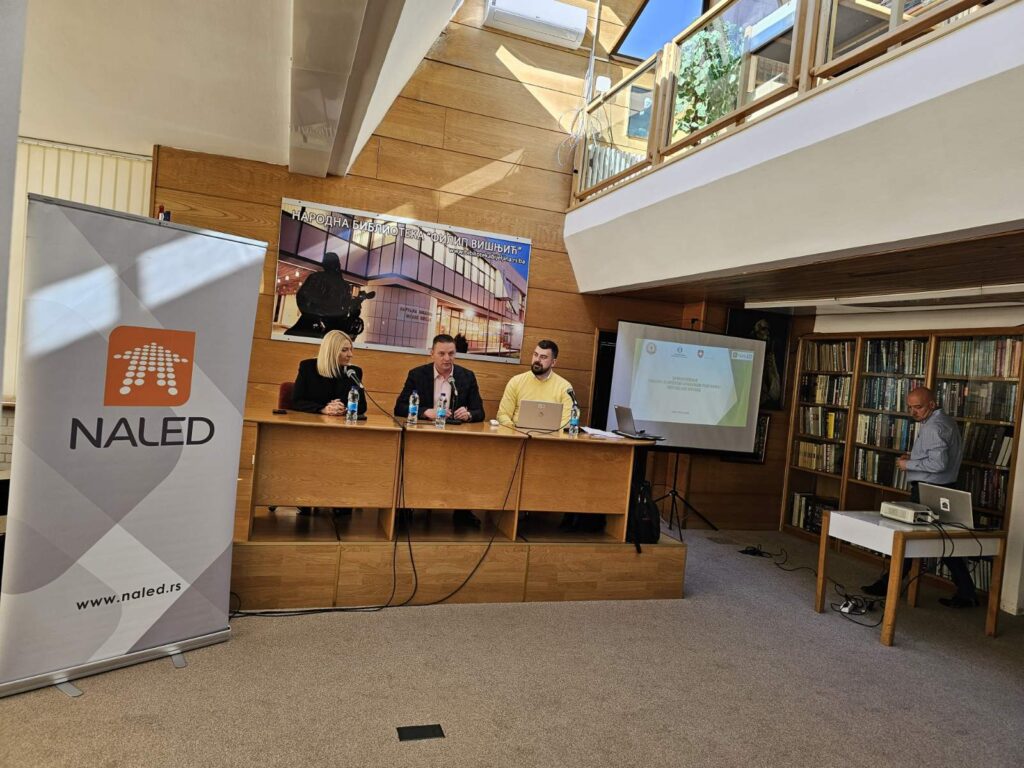
The Republic of Srpska Administration for Inspection Affairs, in cooperation with the European Bank and the National Alliance for Local Economic Development (NALED) from Belgrade, and with the financial support of the State Secretariat for Economic Affairs of Switzerland (SECO), continued its training sessions for inspectors and employees of the institution.
28. April – Wold Safety and Health Day at Work

On the occasion of 28. April, the World Day for Safety and Health at Work, as well on the occasion on 1 May, International Labour Day, we would like to remind employers and workers that the safety and health at work should be the basis and the beginning of each work activity.
Director of Inspectorate pays respect to victims at Donja Gradina Memorial
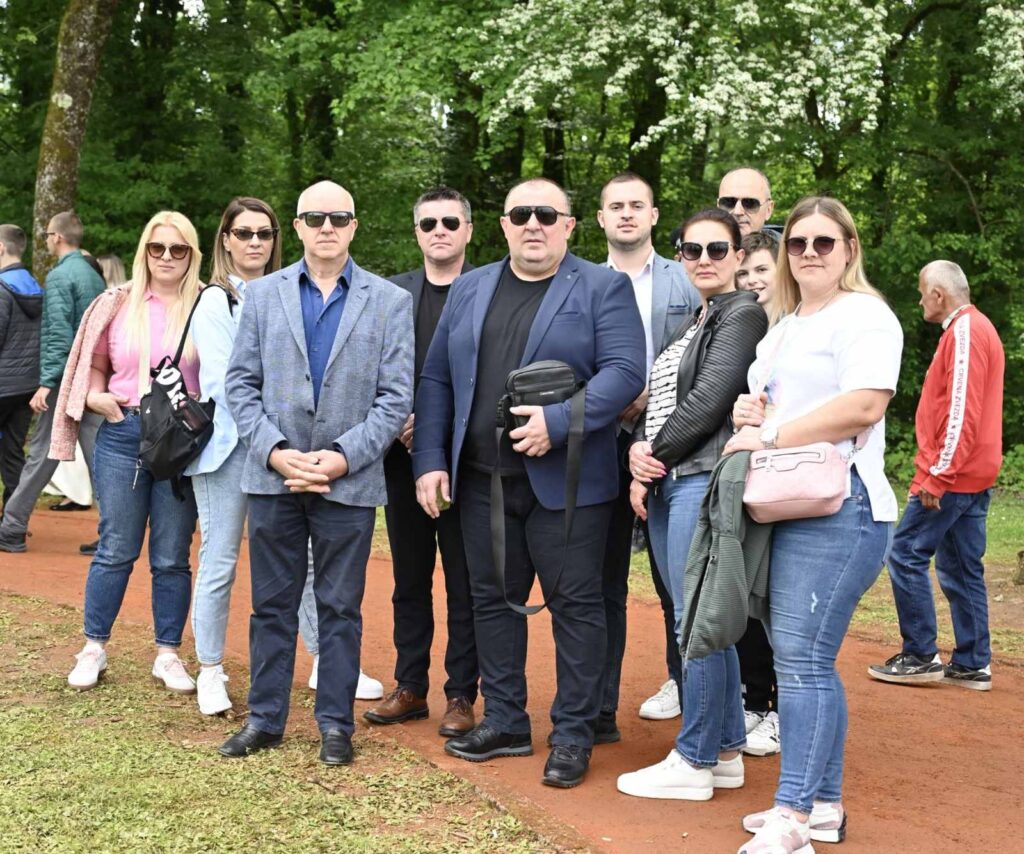
Milovan Krčo, Director of the Republic of Srpska Inspectorate, attended the commemoration of the Remembrance Day for victims of the Ustasha genocide over Serbs, Jews and Roma in the Independent State of Croatia from 1941 to 1945, at Donja Gradina Memorial.
Fines of BAM 170,900 for illegal work this year

In first two months of this year the Market Inspection Service during 77 inspection issued ban of business operation to persons operating illegally, without registration at a competent authority.
Over 100 inspections of night clubs

Competent inspection services have lately conducted 101 inspections of night clubs in the whole of the Republic of Srpska, aimed at check conditions of measures of fire safety, occupational health and safety, and general use of facilities.
Immunisation – our joint responsibility and task
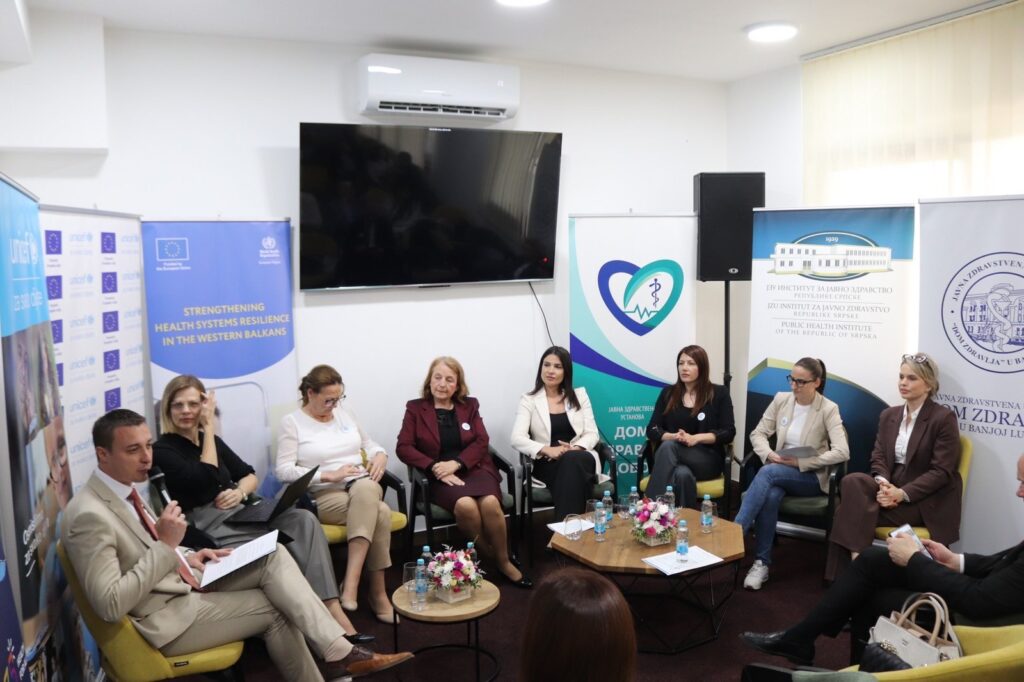
Chief Republic Health Inspector, Milica Matijević, MSc, participated at an expert meeting and panel discussion in Doboj named “Immunisation – our joint responsibility and task”.
Rulebook on the appearance and wear of official uniforms

In accordance with Item 22 of the Guidelines for consultations in drafting laws and other general documents (Republic of Srpska Official Gazette 86/22), Draft of this rulebook is going to be published at the Inspectorate’s webpage for a time period of 15 days in order to receive objections and suggestions to its text.
Import Prohibition for 66 Tons of Seed Potatoes
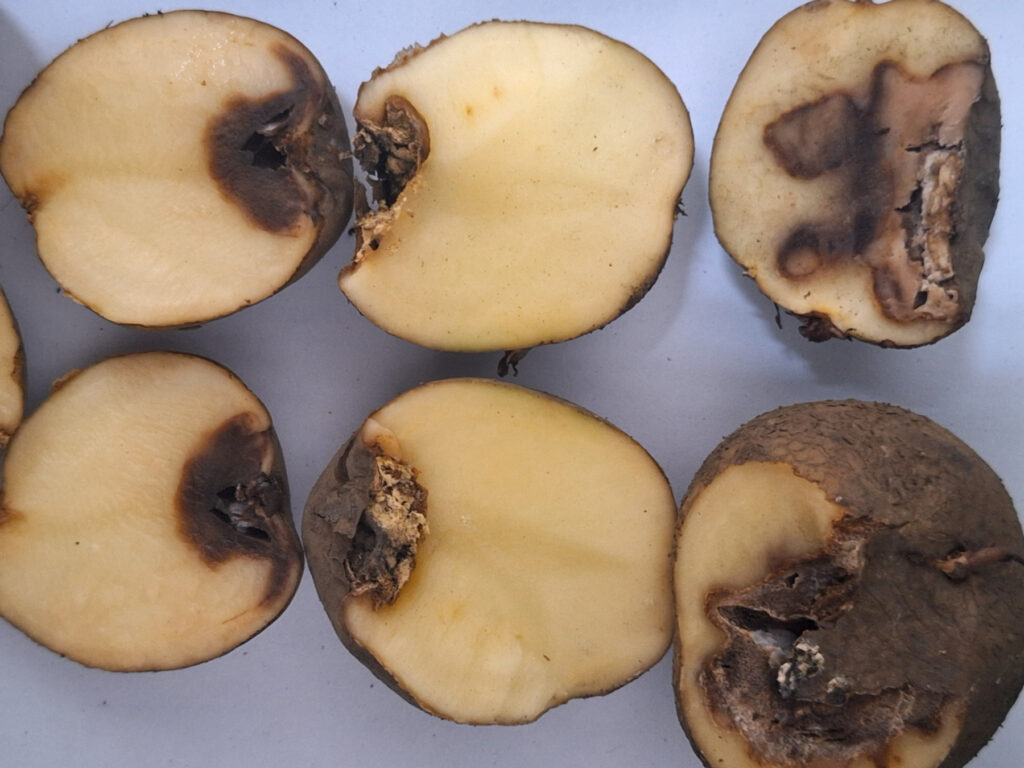
The Republic Phytosanitary Inspection Service has prohibited the import of three shipments of seed potatoes from the Netherlands and France, totaling 66.2 tons, due to the presence of a harmful organism.
Nightclub Inspections Continued

As part of the implementation of the previously announced nightclub inspections, the competent inspection bodies, in cooperation with the Ministry of Internal Affairs of the Republic of Srpska, conducted 37 inspections across the entire Republic of Srpska in the past week. In 32 of these inspections, various irregularities were identified, and with the previous inspections, most of them related to the irregular periodic testing of various installations (such as lighting rod installations and hydrant network), the absence of normative acts on fire safety regulations, insufficient training of all workers regarding fire safety, and the failure to appoint a person responsible for implementing fire safety measures, among other concerns.
Meeting held on implementation of measures for foot-and-mouth disease prevention

Chief Veterinary Republic Inspector Vladimir Milijević attended a meeting held yesterday in Bijeljina regarding the implementation of necessary measures to prevent the occurrence of foot-and-mouth disease. Representatives of all relevant institutions at both the local and republic levels attended the meeting, including business owners and representatives of farmers’ associations.
46 inspections of nightclubs

As part of the implementation of the announced inspections of nightclubs, the competent inspection bodies, in cooperation with the Ministry of Internal Affairs of the Republic of Srpska, conducted 46 inspections across the entire Republic of Srpska last week. The controls encompassed various areas, such as occupations safety, fire safety, and the facility’s compliance with technical documentation requirements.
Training in improving business processes and strengthening human resources
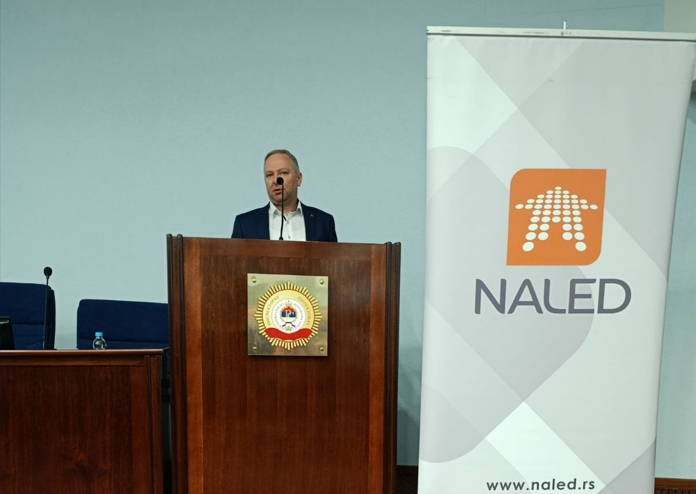
The Republic of Srpska Administration for Inspection Affairs, in cooperation with the European Bank and the National Alliance for Local Economic Development (NALED) from Belgrade, organized a two-day training for inspectors and employees from the regional departments of Banja Luka, Prijedor, and Doboj. On March 18 and 19, all employees had the opportunity to upgrade their existing knowledge through lectures delivered by top-notch lecturers on subjects related to administrative and minor offence proceedings, as well as occupational health and safety.
Import Prohibition for 19 Tons of Seed Potatoes

The Republic Phytosanitary Inspection Service, as part of its regular inspection of shipments in foreign trade, has prohibited the import of seed potatoes totaling 18,750 kilos due to the presence of a harmful organism. During the inspection of one shipment, samples were taken for laboratory analysis.
Clarification for businesses on the subject of announced nightclub inspections

In order to ensure efficient work, and to give legal entities adequate time to prepare the required documentation, which will be requested for review during the announced controls of hospitality establishments and nightclubs, we take this opportunity to clarify what exactly falls within the scope of this control.
Many times, the required documentation for inspection supervision is not available within the establishment, resulting in prolongation of the procedure, and the intention of this authority is to minimize disruptions of the regular work of hospitality establishments as much as possible
Minister Šulić shows support for activities of inspection authorities
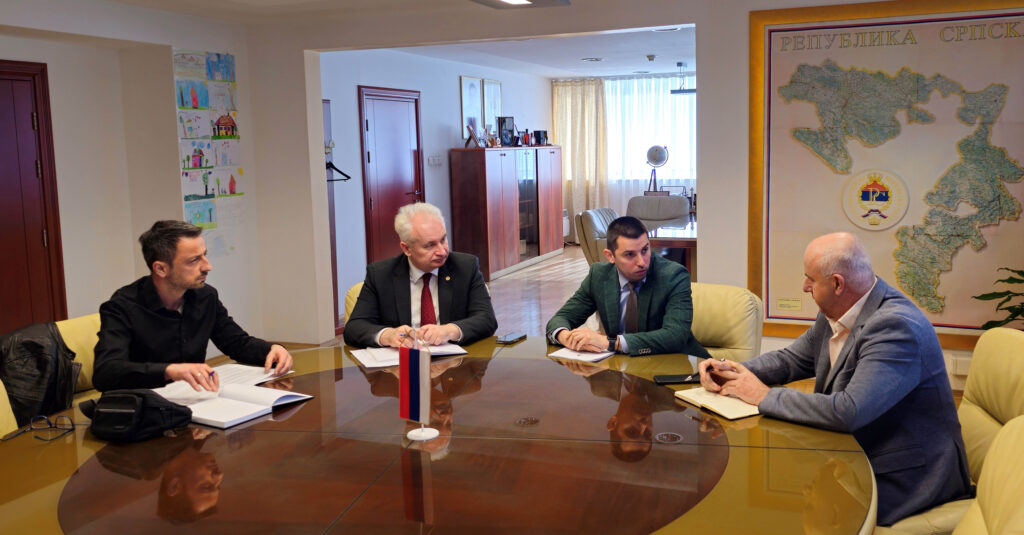
The Minister of Trade and Tourism of the Republic of Srpska, Denis Šulić, showed full support for inspection authorities in their announced controls of all hospitality establishments across the Republic of Srpska that operate as nightclubs and discotheques, and made all necessary Ministry capacities and resources available
Control of Fire Safety Measures

During the upcoming period, the Republic of Srpska Inspectorate, in cooperation with Republic of Srpska Ministry of Internal Affairs, will conduct targeted inspections of the fire safety measures implementation and the use of pyrotechnics in hospitality establishments, with a particular focus on nightclubs and discotheques. The aim of the inspections is to prevent and timely address any possible irregularities that could potentially lead to unwanted incidents, such as the tragedy that occurred in North Macedonia last weekend.
Inspectorate and European Bank together in project implementation
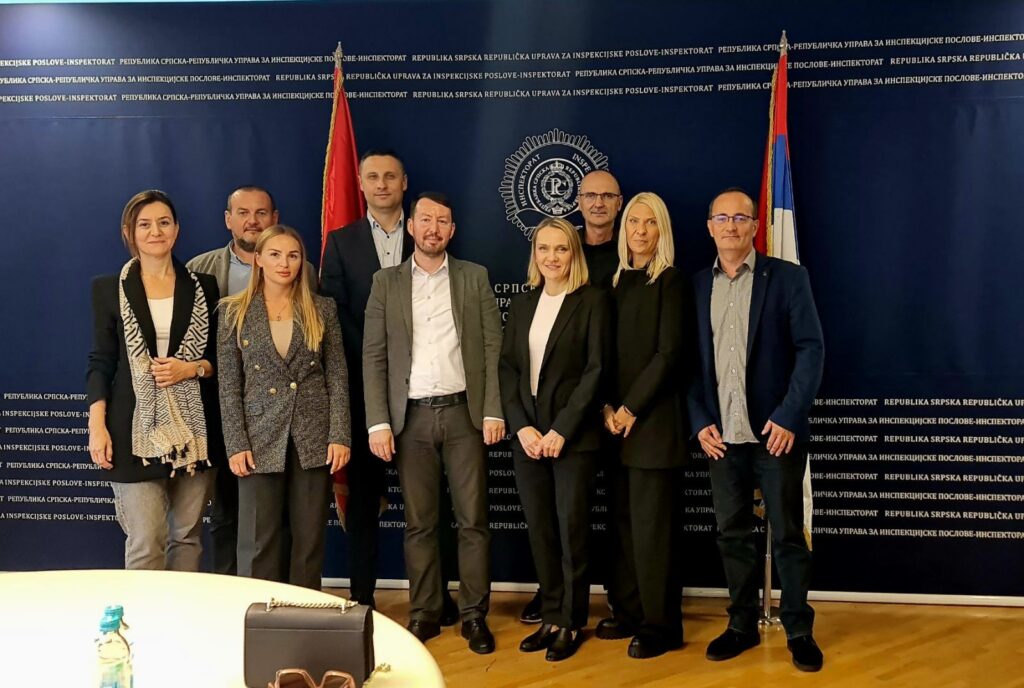
The Republic of Srpska Inspectorate and representatives of the European Bank for Reconstruction and Development – Belgrade Regional Office and National Alliance for Local Economic Development (NALED) from Belgrade held a meeting in Banja Luka.
Main topic of the meeting was the project aimed at providing support to the Republic of Srpska Inspectorate in strengthening institutional capacities, as well as coordination with misdemeanour courts in order to improve law enforcement and effectiveness and efficiency of inspections with increased transparency of inspectors’ work at the same time.
Traffic Inspection Service continuously works on combating illegal activities in traffic

In the area of public roads, this year the Republic Inspection Service conducted over 200 inspections which covered protection, maintenance, construction and reconstruction of public roads. Inspectors issued over 50 administrative measures, ordering irregularities to be removed, and 25 minor offence orders, said Aleksandar Đukić, Chief Republic Traffic Inspector in an interview for BL PORTAL.
Fines amounting to 150,000 BAM have been imposed due to exceeding the prescribed margin

Following the enforcement of the new Regulation on Margin Determination in the Trade of Goods at the beginning of May, the Republic Market Inspection Service started controlling the application of this Regulation. So far, 61 inspections have been carried out in commercial establishments, in 15 of which it was found that the margin defined by the Regulation was exceeded, resulting in fines totalling 150,000 BAM.
Citizens most commonly complain to Education Inspection Service about competitions

Petitions submitted by individuals to the Republic Education Inspection Service mostly concern the conduct of competition procedures for employment in educational institutions, determination of surplus staff, and acquisition of diplomas, emphasized Željko Ostić, the Chief Inspector for Education and Sports, in an interview for BL PORTAL.
Prohibition of the import of 50 tons of potatoes from Egypt

The Republic Phytosanitary Inspection Service, as part of its regular inspection of shipments in foreign trade, has prohibited the import of two shipments of commercial potatoes totaling 50.8 tons originating from Egypt because it was found that they did not meet the prescribed conditions for import and further trade.
Increased control of marking and movement of domestic animals and meat trade

To prevent the recurrence of African swine fever and illegal transportation and slaughter of animals, the Republic’s veterinary inspection, in cooperation with municipal/city veterinary inspection, is conducting increased controls on the marking and movement of domestic animals, as well as the trade of meat for public consumption.
Director Krčo for Glas Srpske: Gray economy constantly under scrutiny

Combating the gray economy remains continuously the focus of the Republic Administration for Inspection Affairs, stated the director of the Republic of Srpska Inspectorate, Milovan Krčo, in an interview for Glas Srpske. In addition to undeclared work as a form of the gray economy, illegal activities are most commonly identified in crafts and service industries, as well as in accommodation rentals. Even registered entities have elements of the gray economy, in terms of the origin of goods and recording transactions, Krčo emphasized. Commenting on the rise in prices of basic foodstuffs, Krčo added that around 300 inspections related to the compliance to the profit margin were carried out this year alone, resulting in fines totaling 135,000 KM for overcharging. He emphasized that the competent inspection service will continue to monitor the market and implement all measures aimed at price control in the upcoming period. You can read the complete interview at the following link: Interview with Director Milovan Krčо
The import of four tons of soybean seeds has been banned due to poor quality

The Phytosanitary Inspection Service of the Republic of Srpska, as part of its regular control of agricultural seed shipments upon import, prohibited the import of a shipment of soybean seeds totaling 4,000 kilograms because it did not meet the prescribed quality standards. During the inspection of the shipment, the inspector conducted sampling for laboratory analysis to assess its quality. Based on the test report, it was determined that the germination rate was below the minimum required for seed quality. Consequently, the importer was prohibited from importing the seeds and instructed to return them to the sender or to destroy them according to the decision of the republic phytosanitary inspector. With the beginning of the planting season, the republic phytosanitary inspection pays special attention to the import control of seeds, planting materials, and other agricultural inputs circulating in the market of the Republic of Srpska, as the quality of these directly affects the yield quality in domestic agricultural production.
Prohibition of import of another shipment of strawberries from Albania

Phytosanitary Inspection Service of the Republic of Srpska has prohibited the import of another shipment of strawberries, totaling 500 kilograms originating from Albania, due to the detection of increased pesticide levels during a routine inspection of imported plant-based food. During the inspection of the shipment, the competent inspector conducted sampling for laboratory analysis to test on pesticide residues. Based on the laboratory analysis report, increased pesticide presence above the values prescribed by the Regulation on maximum residue levels of pesticides in and on plant and animal-origin food and animal feed was determined in the tested sample. Acting on the analysis results, the inspector issued a Decision prohibiting the import and ordering the destruction of the shipment in the presence and under the supervision of the competent inspector. So far this year, a total of six shipments of strawberries originating from Albania have been banned due to increased pesticide content. The competent inspection service will continue with targeted inspections in accordance with risk assessment and the seasonal nature of certain fruits and vegetables in the coming time period.
Prohibition of import for two more shipments of strawberries from Albania

The Phytosanitary Inspection Service of the Republic of Srpska has prohibited the import of two shipments of strawberries, totalling 1,630 kilograms, originating from Albania because, during the regular inspection of imported plant-origin food, an increased pesticide level was detected. During the inspection of the shipments, the competent inspector conducted sampling for laboratory analysis to examine pesticide residues. Based on the laboratory analysis report, an increased presence of pesticides above the values prescribed by the Regulation on maximum residue levels of pesticides in and on food and feed of plant and animal origin was found in the tested sample. Acting on the analysis results, the inspector issued a decision prohibiting the import and ordered the destruction of the shipments in the presence and under the supervision of the competent inspector. In line with the seasonal nature of certain types of fruits and vegetables, the competent inspection service directs special attention to targeted controls, and with the start of the strawberry import season, the focus is on these shipments. So far this year, import has been prohibited for a total of five shipments of strawberries originating from Albania due to increased pesticide levels.
Director Milovan Krčo and Minister Željko Budimir discussed activities of inspection in higher education
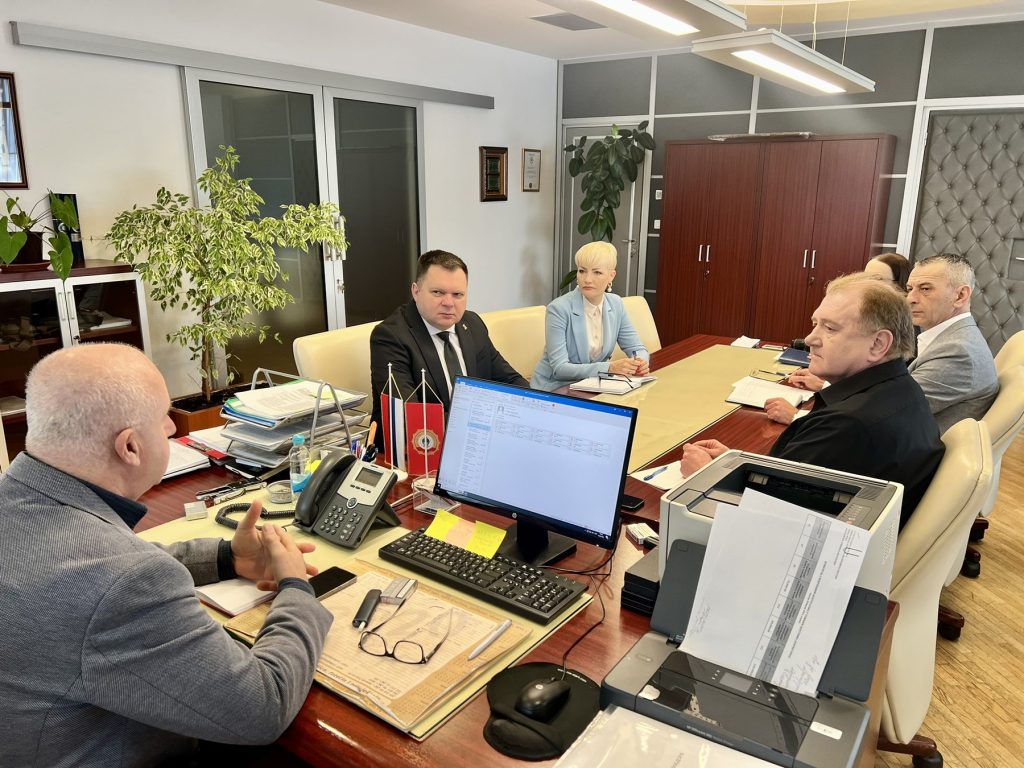
The Minister for Scientific and Technological Development and Higher Education of the Republic of Srpska, Dr Željko Budimir, and the Director of the Inspectorate of the Republic of Srpska, Milovan Krčo, along with their colleagues, held a working meeting today to discuss various issues in the field of higher education, such as the application and improvement of legal solutions, inspection results, and planned activities for the upcoming period. During the meeting, the results of work and the most significant activities of the Republic Education and Sports Inspection Service for the past year were presented, as well as the work plans for the current year. On this occasion, representatives of the inspection bodies informed Minister Budimir on various measures taken at higher education institutions to rectify even the smallest flaws that may affect the process and quality of teaching. Additionally, inspectors noted that alongside regular inspection checks, a significant portion of their capacity is directed towards extraordinary controls based on complaints from other persons and entities and that the supervisory bodies strive to respond to all demands placed before them. Minister Budimir expressed satisfaction with the ongoing cooperation with the Inspectorate of Republic of Srpska so far, emphasizing that the supervisory bodies will always have support from the line ministry and that the common goal of all competent institutions is to improve higher education in the Republic of Srpska as a crucial factor in national and cultural identity. It was concluded during the meeting that through joint cooperation, analysis of available information, and identification of potential issues requiring attention, institutions will act synchronously in the coming period, as investing in higher education is an investment in the future of the Republic of Srpska.
Prohibited import for two shipments of strawberries from Albania

The Phytosanitary Inspection of the Republic of Srpska has banned the import of two shipments of strawberries, totaling 1,370 kilograms, originating from Albania. This decision was made during the regular inspection of plant-origin food imports, confirming an increased pesticide level. The competent inspection strives to implement targeted activities in the control of fruits and vegetables, in accordance with the seasonal nature of individual species. With the beginning of the strawberry import season, special attention is focused on their inspection. Strawberries imported into the Republic of Srpska mostly come from Spain, Italy, Turkey, and Albania, where favorable climatic conditions allow for early strawberry production and production throughout the year. The greatest risk with fruits and vegetables is the presence of unauthorized amounts of pesticides, mycotoxins, and heavy metals, and these are the parameters that are checked. Each imported fruit shipment must be accompanied by a health certificate and a certificate issued by the authorized body of the exporting country. Inspectors verify whether the shipment is accompanied by all necessary documentation, conduct a detailed inspection of the shipment, and, in line with the risk assessment, take samples for analysis. Since the beginning of this year, around 300 samples of fruits and vegetables have been taken for laboratory analysis during import. Additionally, in the past month, the Phytosanitary Inspection has prohibited the import of one shipment of strawberries from Albania, totaling 1,260 kilograms, due to an increased pesticide level. This brings the total number of banned shipments to three so far.
Banned import of 6 tons of seed potato

Under regular inspection of shipments in foreign trade, the Republic Phytosanitary Inspection Service banned import of a shipment of seed potatoes in the amount of 6.250 tons originating from the Netherlands, due to presence of a quarantine harmful organism. During the inspection of the shipment from the import, samples were taken for laboratory analysis. The test results showed the presence of the “Meloidogyne chitwoodi” harmful organism. The Decision of a phytosanitary inspector was banned from import the shipment in question ordered it to be returned to the sender. Considering the fact that the planting season is staring the inspectors during controls of foreign trade give special attention to the quality of seeds of agricultural plants, seedlings, fertilizers and other agricultural processed materials, which is the main precondition for achieving high and quality yield. Bearing in mind the measures that the Ministry of Agriculture, Forestry and Water Management of the Republic of Srpska is taking aimed at incentivising agricultural production and providing support to domestic producers and processors, the Republic Phytosanitary Inspection Service with its activities also aims to provide strong support to domestic production with its activities.
BAM 250,000 160 minor offence orders issued during increased level of inspections

Last week the Republic of Srpska Inspectorate increased the level of inspections of various areas and industries. The focus was on inspections of sales facilities in terms of price formations for products with limited profit margin, but also adherence to other regulations in sales. There were also inspections of catering facilities and bakeries in terms of price formation and adherence, issuing receipts, business records, and regulations dealing with food safety. Special attention was also given to fighting grey economy, illegal employment, unregistered operations in terms of providing services illegally, but also conditions in which registered businesses provide different services. As part of last week’s activities there were 280 inspections, where 120 administrative measures and 160 minor offence orders were issued in the total value of BAM 250,000. The irregularities that were found related to different types of omissions, business records, issuing of receipts, illegal employment, sanitary and hygienic conditions, sanitary examinations of employees, and other. In terms of inspections of prices for basic foodstuffs that have a limited profit margin in accordance with the Regulation on limiting profit margins in trade of goods that can be calculated on the procurement price, the Republic Market Inspection Service conducts such inspections every day. In order to give more specific information on the results of these inspections to the public, we can say that since the beginning of this year in trading facilities there have been 100 inspections of the profit margin regulation, and in five cases inspectors found that the profit margin defined by the Regulation has been exceeded and the traders were issued penalties in the total amount of BAM 75,000. Also, as a part of last week’s activities, inspectors found 20 workers that did not have employment contracts, and for that issued fines to employers in the amount of BAM 42.100. There were also seven bans and BAM 7,500 of penalties for persons performing different unregistered services and sales, while in this year there had been 25 of such bans and BAM 30,000 of such penalties. The Republic of Srpska Inspectorate is going to continue to monitor the situation in the field in the coming time period and adjust its work as the situation requires. We will support all steps that the lawmakers take in order to protect living standards of citizens and as a control authority we are ready to take all measures in the field that line ministries take in order to control the prices.
Shipment of strawberries and pea seeds banned

The Republic of Srpska Phytosanitary Inspection Service banned a shipment of strawberries, originating from Albania, in the amount of 1,260 kilos, after confirming increased content of pesticide during a regular inspection of imported food of plan origin. During the control of the shipment, a competent inspector conducted sampling for laboratory analysis in order to test it for pesticide residues. Based on the Report of the Laboratory Analysis the analysed sample had increased content of pesticides above the levels prescribed by the Rulebook on maximum levels of pesticide residues in food and feed of plant and animal origin. Acting upon the results of the analysis, the inspector issued a Decision banning the import of the shipment in question and ordered it to be destroyed under the supervision of a competent inspector. Also, during regular inspection of shipments of agricultural seeds during import, inspectors also banned a shipment of pea seeds in the amount of 500 sachets, originating from Italy, because the seeds did not meet prescribed quality norms. The Test Report confirmed that the seed germination is under the prescribed quality. Due to irregularities found, the Republic Phytosanitary Inspector issued a Decision banning the import of the shipment and ordered it to be returned to sender or destroyed.
One irregular sample of honey out of 13 tested

In relation to the information that large quantities of honey with low import price are being imported into Bosnia and Herzegovina, which raises suspicion of consumers and beekeepers in the quality of that honey, the Republic of Srpska Food Inspection Service can only speak about inspections conducted at border crossings and customs offices in the Republic of Srpska. Records on inspected imported shipments of food show that 28 shipments of honey and other beekeeping products were imported through border crossings and customs offices in the Republic of Srpska this year. From that number, importers from the Federation of B&H imported six shipments originating from Turkey, four shipments from New Zealand and 13 shipments from Serbia. Importers from the Republic of Srpska imported only five shipments, all of them originating from Serbia. There were periodical samplings for laboratory testing during import and all samples tested were assessed as regular. The Republic Food Inspection Service last month also conducted inspections of honey in the internal market of the Republic of Srpska in order to test for safety and quality. Total of 13 samples were taken from retail facilities and sent for laboratory testing. The analysis showed that only one sample was assessed as irregular in terms of HMF content and diastatic activity. During sampling the inspectors took special notice of the retail price of honey, i.e. they chose products with lower prices, which can be a basis for suspicion of its quality. The samples were sent to the laboratory marked exclusively with codes, without data in the producers, in order to provide for uniform marking of official samples and testing in the laboratory.
Import of almond seedlings from Turkey banned

The Republic Phytosanitary Inspection Service, as part of the regular control of shipments of seeds of agricultural plants during import, banned the import of almond seedlings originating from Turkey in the amount of 300 pieces. During the control of the shipment, a competent inspector conducted sampling for laboratory analysis in order to test it for harmful quarantine organisms. The laboratory analysis determined the presence of the quarantine harmful organism Xanthomonas arboricola pv. Pruni, causing a bacterial spot on leaves, a weakness of the nut trees. Acting upon the results of the analysis, the inspector issued a Decision prohibiting the import and ordering shipment in question to be returned to sender or destroyed under the supervision of a competent inspector.
Import of mandarins from Turkey banned

The Republic Phytosanitary Inspection Service, as part of the regular control of shipments of food of plant origin during import, banned the import of mandarins originating from Turkey in the amount of 6,800 kilograms, due to the increased content of pesticides. During the control of the shipment, a competent inspector conducted sampling for laboratory analysis in order to test it for pesticide residues. Based on the Report of the Laboratory Analysis issued by „Institut za vode“ Bijeljina, the analyzed sample had increased content of pesticides with values above the prescribed with the Rulebook on maximum levels of pesticide residues in and on food and feed of plan and animal origin. Acting upon the results of the analysis, the inspector issued a Decision prohibiting the import and ordering shipment in question to be returned to sender or destroyed under the supervision of a competent inspector.
After the analysis, “Prime Hydration” withdrawn from the market

Considering the increased public interest regarding the circulation of the non-alcoholic beverage “Prime” in the market of the Republic of Srpska, the republic food inspection has sent five samples of the product “Prime Hydration” for laboratory analysis to assess its health safety and compliance with regulations. The results of the laboratory analyses revealed that the product’s label, marked in one of the official languages in use in the Republic of Srpska, is not in compliance with the current legal regulations, and not all necessary information is provided compared to the original label. Furthermore, it was determined that the product “Prime Hydration”, classified as a nutrient-enriched food, is not listed in the Register of Nutrient-Enriched Foods maintained by the Ministry of Health and Social Welfare of the Republic of Srpska, which is a legal obligation. Nutrient-enriched food is food to which vitamins, minerals, and certain other substances with specific nutritional or physiological effects, excluding vitamins and minerals, are added. Every entity involved in the food business, before placing food for special dietary purposes, dietary supplements, and nutrient-enriched food on the market in the Republic of Srpska, is obligated to submit an application to the Ministry for the registration of food for special dietary purposes, dietary supplements, and nutrient-enriched food in the Register of Food for Special Dietary Purposes, the Register of Dietary Supplements, and the Register of Nutrient-Enriched Foods. In light of the above, the food safety inspection is implementing a measure to withdraw the product from the market, in accordance with the provisions of the Law on Food, which stipulates that it is prohibited to market nutrient-enriched food that is not registered in the appropriate registry. We hereby urge traders, if they have not been informed about the product recall, not to wait for the arrival of inspectors but to independently remove the product from circulation. Regarding the assessment of health safety, the analysis has determined that the values of the tested parameters fall within the reference values defined by the current regulations. We would like to remind you that through inspections of points of sale and during imports, it has been determined that the product “Prime Energy” has not been circulated in the Republic of Srpska. This product had previously been banned in Slovenia and Croatia due to the presence of “L-theanine,” which is not permitted in non-alcoholic beverages.
“Prime” beverage to be analysed

Bearing in mind increased interest of the public relating to marketing of Prime non-alcoholic beverage in the Republic of Srpska, the Republic Food Safety Inspection Service has sent five samples of this product for laboratory testing, safety assessment and compliance of the declaration with standing regulations. Said beverage is being produced in two variants – Prime Energy and Prime Hydration. Inspections of points of sale and distributors in the Republic of Srpska found that Prime Energy, which had previously been banned in Slovenia and Croatia due to unpermitted substances in its contents, has not been circulated in the Republic of Srpska. In that regards, inspectors found in circulation the Prime Hydration variant which they sent for laboratory testing. We expect the analyses to be completed next week, after which we are going to have an official assessment by an authorised laboratory on how safe this product is.
Six criminal charges for trading pigs without necessary documentation

The Veterinary Inspection Service of the Republic of Srpska has filed six criminal charges against individuals who traded pigs originating from infected and endangered areas without identification ear tags, animal health certificates issued by the veterinary organization implementing the Program of Measures, nor did they have a transaction confirmation. In other words, they engaged in the trade without proper veterinary documentation. The pigs were traded from the Semberija region to the areas of Istočno Sarajevo, Milići, Foča and all municipalities in Herzegovina. Considering the epidemiological situation related to African swine fever, which has led to the euthanasia and safe disposal of tens of thousands of pigs, causing significant economic losses, the irresponsible behavior of individuals has increased the risk of further spreading of the disease. During the illegal transportation from endangered and infected areas, irresponsible traders and farmers contributed to the spread of African swine fever to other regions of the Republic of Srpska. Timely intervention has halted the further spread of the disease, and the situation is under continuous monitoring by relevant authorities. However, we still need to appeal to individuals to act responsibly. African swine fever cannot be cured, and the disease can only be controlled through euthanasia of animals. We hereby appeal to farmers not to sell or purchase pigs without the necessary veterinary documentation. We would like to warn individuals who are considering acquiring pigs in this manner, reminding them that, in the event of disease occurrence, they will be responsible for covering all the costs of laboratory analyses, which are not small. Until now, these costs have been covered by the Ministry of Agriculture and Forestry of Republic of Srpska in the regular procedure. Additionally, in the case of damage due to illness and the euthanasia of pigs, they will not be eligible for any assistance from the state. Any agricultural producer who is not in compliance with animal marking, labeling, and health certification will not have the right to compensation for damages. The Veterinary Inspection Service, in collaboration with the Republic of Srpska Ministry of Interior, will continue increased inspections of pig trafficking in the Republic of Srpska in the coming period. We urge producers and individual households to adhere to prescribed measures, specifically to obtain appropriate veterinary documentation when engaging in pig transportation. The inspection will sanction any individual case where animals are found without ear tags or the required accompanying documentation for their transport.
Meeting of Minister of Labour and Labour Inspection Service
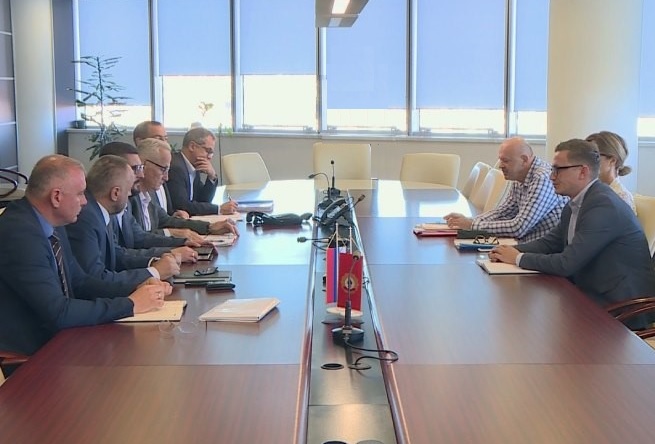
Yesterday, Minister of Labour and Protection of Veterans and Disabled Persons Danijel Egić held a working meeting with Chief Republic Labour Inspector Vladimir Glišić on analysis of the implementation of the Labour Law and Law on Inspections. Minister Egić stated several important topics to be discussed at the meeting, such as importing foreign workers, quotas for such workers, and other topics important for the business community, workers and unions. He stressed that there are talks with social partners on increasing the minimum wage in the Republic of Srpska and that he hopes they would come to an agreement. Chief Republic Labour Inspector Vladimir Glišić pointed out that 35 percent of inspections are with found irregularities which mostly relate to the violations of the Labour Law in the area of labour rights in terms of undeclared and illegal work, but also to the implementation of occupational health and safety measures, especially in the area of construction as one of the high-risk industries.
Banned import of 43 tons of mercantile potato

The Republic Phytosanitary Inspection Service, as part of the regular control of shipments in foreign trade, banned the import of two shipments of mercantile potatoes in the amount of 43.3 tons originating from Austria, because it was determined that they did not meet the quality requirements. Through inspection of the shipments, a significant presence of rotting tubers was determined. The entire shipment emitted an unpleasant and offensive smell of rot, rendering them unacceptable and unsuitable for human consumption. The Phytosanitary inspector issued a Decision banning the import of the shipment in question and ordered it to be returned to sender. The Law on Food of the Republic of Srpska prescribes that when determining whether food is suitable for human consumption, consideration is given to whether the food is unacceptable due to contamination by external causes or by other means, or due to rotting, spoilage, or decay. Furthermore, in accordance with the provisions of the Law on Food of Bosnia and Herzegovina, food is considered unsuitable for human consumption if the sensory attributes of the food have been changed due to physical, chemical, microbiological, or other processes to such an extent that the food is not suitable for human consumption.
Price formation remains subject of controls

The Republic Market Inspection Service has continued its regular controls of price formation for essential food products in this year as well, for which, by the Regulation on limiting profit margins in the trade of goods, a maximum margin amount that can be calculated on the purchase price is limited. During this year, a total of 171 inspections on the formation of prices of basic food products were carried out in shopping centers and markets. In 23 cases, it was determined that traders did not adhere to the prescribed margins when forming prices, resulting in fines in amount of BAM 345,000. Additionally, inspectors identified other types of irregularities related to invoicing, price compliance, business bookkeeping, and records maintenance. Consequently, 154 misdemeanor orders were issued to traders, in total amount of BAM 94,100. In each inspection where the margin was found to be exceeded, the price correction was ordered. In cases where these deviations amounted to a few pfennigs, such correction is not noticeable in consumers’ budgets, but for the inspection, even these minor deviations are considered violations. We would like to remind you that margin restriction applies solely to basic food products precisely defined by the Regulation and that for all other products, prices are formed according to market supply and demand. In other words, it is a question of free formation of prices, as prescribed by the Law on Price Regulation. Furthermore, regular inspections are also conducted to ensure compliance with the Regulation on limiting profit margin in price forming of liquid oil derivatives. In this year, a total of 113 controls on the formation of prices of liquid oil derivatives were carried out, of which eleven were found to have irregularities, because traders did not adhere to the prescribed profit margins during the formation of prices. On that basis, fines in the total amount of BAM 165,000 were imposed. Also, due to other types of irregularities related to keeping business books and records and the like, fines in the amount of BAM 26,400 were imposed. In accordance with the work plans of the Chief Republic Market Inspector, inspections of price formation will continue in the upcoming period. The Market Inspection Service will monitor the situation in the field and adjust its work as the situation demands.
Recommendations for breeders to control African swine fever

African swine fever is an extremely contagious disease that spreads through direct contact between animals and indirectly through insects, contaminated facilities, vehicles, products, food, and human movement. Given the numerous ways this disease is transmitted farmers play a crucial role in its containment by implementing a series of preventive measures to reduce the risk of infection spread. Enhance security of animal housing facilities The facility must be fenced with controlled access. Vehicle and pedestrian disinfection points should be established at entrances and maintained regularly. If feasible, double fencing can be used to prevent direct contact between domestic pigs and wild boars and other animals (dogs, cats and other domestic and wild animals). Use food from verified sources Pigs should not be fed with fresh grass, hay or grains collected from areas within infection zones. In certain areas, it’s a practice for pig owners to feed them various forest fruits, which is unacceptable. Wild boars are the primary carriers of this disease, and any contact with contaminated food or surfaces they have been in contact with can lead to direct transmission. Grains should be stored for at least two months before use to allow the virus to disappear. Avoid feeding animals with food leftovers The virus remains active in frozen meat for up to three years and in thermally untreated pork products, such as dried meat, for up to 400 days. Kitchen waste is often thrown into pig-feeding waste bins, posing a contamination risk. Food leftovers should be disposed of in dedicated closed waste containers. Restrict human and vehicle access to farms After wild animals, humans are the second largest carriers of African swine fever. Owners often visit neighbouring farms out of curiosity or fear to inquire about their animals’ health, potentially transferring the virus on their clothing. Limiting access to third parties on farms, except authorized personnel, is essential. Use special clothing, footwear, and tools Strict hygiene measures must be implemented in pig housing facilities, changing clothing and footwear when entering and leaving areas where pigs are held, handwashing and disinfection, and disinfecting footwear at the entrance are necessary. Additionally, equipment and tools used on the farm should not be taken out and brought back into the animal areas. Properly manage waste coming from farms The improper disposal of solid manure and wastewater from a pig farm, in case the virus is present, can lead to the accelerated spread of the virus in the surrounding area. Proper waste management is essential. Preventive measures in hunting Farm owners that have pigs should avoid moving in forests and participating in hunting activities. The virus remains active on the path of infected wild boars for up to two months and moving in these areas can carry the virus on footwear and introduce it to households or farms. In case of observing wild boars showing signs of illness, unusual behaviour, or finding a dead pig, it is necessary to immediately notify the authorised veterinarian without approaching or making contact with the animal or carcass.
Invoice issuance subject to increased inspection efforts

In order to combat illegal trafficking of goods and services, the Republic Market Inspection Service conducted an operation in the past month during evening hours in hospitality establishments, nightclubs, and discotheques, aimed at inspecting invoice issuance and transaction recording. Out of a total of 64 conducted inspections, only four were in compliance, while in 60 cases inspectors found that the business entities did not issue invoices properly for the sold goods or provided services, for which they were fined in the amount of BAM 57,000. Businesses that do not issue receipts are disloyal competition to those who respect the law and meet their obligations. Considering that the summer tourist season is ongoing and that there is increased activity in establishments providing hospitality and tourism services, the Market Inspection Service will continue intensified efforts in the upcoming period as part of implementing measures to combat the informal economy.
Increased inspection of tourist agencies

With the ongoing annual holiday season, the Republic Market Inspection Service continues its practice to increase inspections of tourist agencies prior and during this season. The primary aim of these inspections is to have businesses operate in accordance with the law, which directly affects end users of these services and their rights stemming from contracts signed with the agency. During the last year the Republic Market Inspection Service conducted 26 inspections of tourist agencies and nine of them were with found irregularities. Based on this, inspectors issued seven Decisions on removal of irregularities and issued four minor offence orders in the total amount of BAM 10,000. The omissions found related to business records, individual contracts and travel certificates with users, records of contracts signed with third parties, and records of contracts of individual tourist packages holidays or outings. When inspecting tourist agency, the priority is to determine whether they own the license of the Republic of Srpska Ministry of Trade and Tourism, approving the operation of the tourist agency. The inspectors then inspect whether they meet requirements in term of offices, staff, insurance, record keeping, etc. In terms of consumer rights protection, inspectors check whether the prices of offered packages clearly shown, whether the travel programmes available to consumers, whether the agency informed the users with General Travel Conditions, whether the receipts are issued, whether travel arrangement contracts are signed with the users of travel packages, whether the clients are issued Travel Certificates, etc. The Republic of Srpska Law on Consumer Protection prescribes that a tourist agency performing travel arrangement operations and a tourist agency intermediating in the organisation of a tourist travel is obliged to sign a contract with each consumer on a tourist package deal that must contain all necessary data defined by this law. The consumer needs to receive at least one copy of the contracts, and if the agency does not do that, the consumers need to insist on their copy.
44,944 imported food shipments inspected in first half of year

In the first half of 2023, the competent inspection services of the Republic of Srpska Inspectorate conducted 44,944 controls on food shipments in foreign trade during import. Inspectors check the accompanying documentation of the shipment, perform organoleptic examination and food sampling for laboratory analysis. In accordance with the estimated risk, potential irregularities in different types of products are identified, and analyzes are used for the examination of the parameters that represent the greatest risk in a particular product. For example, biggest risk for fruits and vegetables is the unpermitted amount of pesticides and heavy metals, and these are the parameters analyzed for this type of food. Special attention of inspectors is focused on products where some irregularity was found in previous controls, seasonal products, products for which there are certain risks in the countries of the region or if irregularities were found in those countries, and the like. In the observed period in the control of food imports, inspectors took 1,530 samples for laboratory analysis of health safety and quality. After analyzes were carried out, for 10 food shipments were prohibited from being imported. Irregularities were found in shipments of zucchini from Albania, carrots from Egypt, mangoes from Brazil due to the increased presence of pesticides, grain shipments from Serbia due to the presence of mycotoxins and others. It is important to note that shipments from which samples were taken for analysis are prohibited from being marketed, distributed or processed until the Decision of the inspector is made in accordance with the results of the laboratory examination of the samples. With regard to this procedure, in cases where the analyzes reveal some irregularity, there is no risk that the food has been consumed, because it was not even available to consumers. In the first half of this year, in internal traffic, competent inspection services carried out 1,180 controls at subjects in the food business. The inspectors controlled the hygienic conditions of the facility and equipment, the operation of the cooling devices, the method of food storage, the hygienic procedures of the employees, the declarations and sensory properties of the food and more. Determining health defective food is much rarer than determining various irregularities that can result in defective food, such as irregular sanitary inspections of employees, failures in maintaining hygiene in facilities that deal with food production and circulation, improper manipulation of food and the like. In the observed period, by the order of the inspection, about three tons of different food were withdrawn from circulation. Most often, these are products that by their nature have a shorter life, such as dairy products, soft drinks and juices or confectionery products. The work of inspectors at the border, expert risk assessment, timely identification of potential irregularities and the taking of prescribed measures resulted in food of the prescribed quality being found on the market. Competent inspections are engaged in their full capacity and perform daily surveillance of subjects involved in the production and trade of food, and based on the above, we can say that controlled food is traded on the market of the Republic of Srpska.
In six months 2.5m fees paid in foreign trade

According to preliminary data, in first six months of this year, inspectors of the Republic of Srpska Inspectorate conducted 55,570 controls of imported shipments in foreign trade. Based on the supervision of foreign trade, fees in the total amount of BAM 2,553,804 were paid into the budget of the Republic of Srpska. In this reporting period and in the internal market, inspectors conducted 12,774 inspections of businesses, and found violations in 3.858 cases, or in 30% of cases. For irregularities found the inspectors issued 2.243 administrative measures ordering businesses to take measures and action in order to remove those omissions. For violations committed inspectors issued 2,045 minor offence orders in the amount of BAM 2,843,100, while they submitted 18 minor offence reports to competent courts. As we can see from the structure of issued measures, inspectors sanction all cases where irregularities are found and order for those irregularities to be removed, or issue penalties. During the inspection procedures inspectors confiscated wooden forest assortments evaluated to BAM 61,000, goods without origin in the amount of around BAM 2,200, as well as 2,200 kilograms of tobacco. Inspectors also ordered around 3,200 kilograms of foodstuffs to be destroyed due to expired shelf life, changes in sensory properties, and unsuitable declarations. Inspectors also controlled labour contracts of 5,921 workers they found working in businesses. Total of 111 of employees did not have a signed labour contract and were not registered for mandatory types of insurance, so the employers were fined in the total amount of BAM 194,200.
Import of 200 kilograms of mangos from Brazil banned

The Republic Phytosanitary Inspection Service, as part of the regular control of shipments of food of plant origin during import, banned the import of fresh fruit, mangos, originating from Brazil, in the amount of 200 kilograms, due to the increased content of pesticides. During the control of the shipment, a competent inspector conducted sampling for laboratory analysis in order to test it for pesticide residues. Based on the Report of the Laboratory Analysis issued by „Institut za vode“ Bijeljina, in the analyzed sample, an increased presence of the pesticide “Thiabendazole” was found above the values prescribed by the Rulebook on maximum levels of pesticide residues in food and feed of plant and animal origin. Acting upon the results of the analysis, the inspector issued a Decision banning the import of the shipment in question and ordering the destruction of the shipment under the supervision of the competent inspector.
Import of more than 18 tons of fresh carrots banned

The Republic Phytosanitary Inspection Service, as part of the regular control of shipments of food of plant origin during import, banned the import of fresh carrots originating from Egypt, in the amount of 18,720 kilograms, due to the increased content of pesticides. During the control of the shipment, a competent inspector conducted sampling for laboratory analysis in order to test it for pesticide residues. Based on the Report of the Laboratory Analysis issued by „Institut za vode“ Bijeljina, in the analyzed sample, an increased presence of the pesticide “Chlorpyrifos” was found above the values prescribed by the Rulebook on maximum levels of pesticide residues in food and feed of plant and animal origin. Acting upon the results of the analysis, the inspector issued a Decision banning the import of the shipment in question and ordered it to be returned to sender.
Petrol stations fined BAM 75,000 for non-compliance with profit margin regulations

The Republic Market Inspection Service regularly controls compliance with the Regulation on limiting profit margin in price forming of liquid oil derivatives. The above-mentioned Regulation stipulates a maximum wholesale profit margin in the absolute amount of BAM 0.06 KM per liter of derivatives for traders who carry out the activity of wholesale trade in oil derivatives. The maximum retail margin in the absolute amount of BAM 0.25 KM per liter of derivatives is prescribed for traders who carry out the activity of retail trade in oil derivatives. Until mid-May of this year, 67 controls on the formation of prices of liquid oil derivatives were carried out, of which five were found to have irregularities, because traders did not adhere to the prescribed profit margins during the formation of prices. On that basis, fines in the total amount of BAM 75,000 were imposed. Also, due to other types of irregularities related to keeping business books and records and the like, fines in the amount of BAM 17,600 were imposed.
Traders fined BAM 210,000 for non-compliance with profit margin regulations

By mid-May of this year, the Republic Market Inspection Service carried out 99 controls on the formation of prices of basic foodstuffs. In 14 cases, it was determined that traders did not adhere to the prescribed profit margins when setting prices, and fines in the total amount of BAM 210,000 were imposed. Also, the inspectors found other types of irregularities in the sales facilities, which were related to the issuing of invoices, adherence to prices, keeping business books and records, and on that basis fines in the amount of BAM 45,800 were imposed. The Regulation on limiting profit margins in the trade of goods limits the maximum amount of margin that can be calculated on the purchase price. The aforementioned Regulation defines that companies, other legal entities and entrepreneurs dealing with the wholesale trade of goods determine the prices of certain products by applying a profit margin of 6% to the purchase price, and entities dealing with the sale of goods at retail establish the prices of certain products by applying a profit margin in a percentage of 8% on the purchase price. The purchase price on which the profit margin is calculated includes the manufacturer’s or supplier’s invoice price, increased by the dependent procurement costs, which are defined by this Regulation (such as the costs of customs clearance, transport, storage and the like). As a rule, the final amount of the retail price depends on the amount of the purchase price, on which the prescribed profit margin percentage is calculated, and if there is an increase in the purchase price, the final retail price will also be higher. In accordance with the aforementioned Regulation, the profit margin limit applies to the following types of goods: For all other products that are not covered by this Regulation, prices are formed in accordance with supply and demand on the market, respectively, it is a question of free formation of prices, as prescribed by the Law on Price Regulation.
Increased control of one-day rental accommodations

In order to suppress the unregistered activity of providing accommodation services based on the “one-day rental” principle, the Republic Market Inspection Service conducted an activity in the past month with 233 inspections carried out. In 43 cases, it was determined that the persons did not properly register the business activity, and they advertised these services, for which they were banned from further work, as well as fined. Also, there were cases where certain irregularities were found in registered entities, and in these cases measures were ordered to eliminate irregularities and fines were imposed. As part of this action, fines in the total amount of BAM 30,200 were imposed. This type of accommodation rental by natural persons is defined by the Law on Hospitality from 2017. Given that the legal prerequisites for the provision of these types of services have been created, we would like to emphasize that the priority goal of inspections is not fines, but the registration and legalization of entities, i.e. the introduction of their business within the legal framework. We appeal to natural persons who provide this type of services or plan to start performing this activity, not to wait for the arrival of the inspector, but to initiate the legalization procedure on their own. The inspection will undertake all available measures in order to suppress unregistered activity, which represents unfair competition to entities that work legally and pay their obligations to workers and the state.
Occupational safety and health should be basis of every work activity

On the occasion of marking April 28, the World Day for Safety and Health at Work, the Republic of Srpska Inspectorate would like to remind employers and employees once again that safety and health at work should be the basis and beginning of every work activity. Bearing in mind that an employee spends at least a third of the working day at work, a safe workplace is a basic prerequisite for maintaining and improving both physical and mental health. Safety and health at work are areas of special social interest, especially in high-risk activities. The goal of the Republic of Srpska Inspectorate is to ensure the preservation of workers’ working abilities, safe and healthy working conditions, and to contribute to raising the level of awareness of the importance of implementing and observing occupational safety measures through the implementation of the Law on Occupational Safety and Health. Through daily preventive work in the field, the inspectors strive to, in addition to taking corrective measures, familiarize employers and workers with their rights, obligations and how they can jointly improve working conditions in the Republic of Srpska through educational activities. The goal of the supervision policy in the field of safety and health at work is first of all the prevention of injuries at work and occupational diseases, and it is based on the initiation of a series of activities in several areas of activity, such as the application of preventive measures in all forms of work, the training of employees for safe and healthy work, monitoring the health status of employees, monitoring the conditions of the working environment. Life, health and preservation of working abilities are values that directly affect the economic development of the entire society. A safe workplace should be a priority for both employers and workers. Good safety at work increases the productivity and competitiveness of the employer, as well as the success of achieving business plans and goals. On the labor market, healthy workers have longer working capacity and work engagement, while from the point of view of health care, the number of workers on sick leave and treatment costs are reduced. The common goal of the social community should be to raise the level of awareness of the culture of prevention, as well as to create a safe and healthy working environment in which dangers and risks for workers will be reduced to a minimum.
196 controls on use of incentive funds

In the past month, the Agricultural Inspection Service of the Republic of Srpska carried out increased controls on the use of incentive funds. In the past month, republic and city/municipal agricultural inspectors performed 196 controls on the use of incentive funds, within which 694 implemented incentive measures were controlled. The total amount of controlled incentive funds is BAM 7,293,366.15. The funds were intended for various purposes, such as perennial crops, agricultural machinery, irrigation, premiums for milk, premiums for breeding heifers and others. Out of the total number of controls performed, only three controls were irregular, and inspection Decisions ordered the return of incentive funds in the total amount of BAM 13,580 and misdemeanor orders in the amount of BAM 3,000 were issued. Depending on the type and purpose of the incentives, the control covers funds allocated in previous years. For example, if it is a question of incentive funds for the purchase of agricultural machinery, the beneficiary of the incentive cannot alienate (sell) the acquired machinery within a period of three years and is obliged to present the procurement documentation to the inspector, as well as the machinery itself on the spot. In accordance with the above, the control included incentive funds from 2020 in order to determine whether the beneficiaries complied with the three-year deadline, as well as funds from 2021 and 2022. Given the different types of incentives provided by the Ministry of Agriculture, Forestry and Water Management of the Republic of Srpska, the conditions for their implementation are also different, and the inspection service in each individual case checks the fulfillment of the conditions for the incentives that the controlled entity has achieved. Beneficiaries of incentives are obliged to keep the documentation on the basis of which they obtained incentive funds for at least three years from the date of receiving the funds. As part of the inspection control, the inspector requests that the above-mentioned documentation be presented to him, and by inspecting the documentation and inspecting the site, he states the factual situation. Beneficiaries of incentives are obliged to use incentive funds and other forms of support in agriculture. The user of the right is obliged to return the incentive funds obtained on the basis of incorrectly stated data or if they are used for an inappropriate purpose, and in accordance with the Decision of the competent inspector ordering the return of the funds. In these cases, the user is assigned a passive status until further notice from the date of the Decision by the competent inspector, all rights to incentive funds are blocked, for the shortest period of two years, counting from the date of return of the incentive funds, together with default interest. The aim of the work of the Agricultural Inspection Service is to provide strong support to domestic agricultural production and honest producers who invest great efforts in improving and increasing production.
Import of 1,258 fruit seedlings banned

The Republic Phytosanitary Inspection Service, as part of the regular control of shipments of seeds of agricultural plants during import, banned the import of 1,258 pieces of fruit seedlings originating from Turkey. During the inspection of the shipment, the inspector determined that the specified shipment was not accompanied by the necessary documentation and a phytosanitary certificate of the country of origin/export, which means that the legally prescribed conditions for the import of the shipment of plants were not met. Based on the above, the inspector issued a Decision banning the import of the shipment in question and ordered the destruction in the presence and under supervision of the competent inspector. The Republic Phytosanitary Inspection Service during importation at the border crossings of Republic of Srpska carries out detailed controls of import planting material. The quality of seeds of agricultural plants, planting material, fertilizers and other raw materials is a basic prerequisite for achieving high and quality yields, which is why the inspection carries out continuous supervision over its traffic, both during import and in internal market. The aim of the inspection is to ensure high-quality agricultural raw materials that are traded and used in the Republic of Srpska and thus provide strong support to domestic agricultural production.
Import of corn seeds from Italy banned

The Republic Phytosanitary Inspection Service, as part of the regular control of shipments of seeds of agricultural plants during importation, banned the import of a shipment of corn seeds originating from Italy, in the amount of 3,900 kilograms, because it did not meet the prescribed quality standards. During the inspection of the shipment, the inspector carried out sampling for laboratory analysis in order to test the quality. Based on the Report of the laboratory analysis issued by “Agricultural Institute of the Republic of Srpska” it was determined that germination was below the minimum prescribed for seed quality. Based on the above, the Republic Phytosanitary Inspector issued a Decision banning the import of the shipment in question and ordered it to be returned to sender. Considering the beginning of the sowing season, the Republic Phytosanitary Inspection Service is paying special attention in this period to the control of the import of seeds, planting material and other agricultural raw materials that will be sold on the market of the Republic of Srpska. Domestic agricultural production has a special importance for the domestic market and the domestic processing industry, and competent institutions invest all available resources and capacities in order to achieve the highest quality yields. We appeal to agricultural producers to buy agricultural raw materials exclusively from registered facilities, from businesses that sell products of verified quality, properly declared and labeled.
World Consumer Rights Day

Acknowledging the fact that consumers are the largest economic group that is affected by the behavior of business entities, i.e. their compliance with the law, the Republic of Srpska Inspectorate undertakes activities to improve respect for consumer rights in the Republic of Srpska through its daily work, both preventive and corrective. On the occasion of March 15, World Consumer Rights Day, we would like to point out that this day is only a reminder of the fact that the inspection authorities, in cooperation with line ministries and associations for the protection of consumer rights, work diligently throughout the year to enforce the law, but also to make consumers aware of their rights. The mission of the Inspectorate is to create a positive atmosphere for the empowerment of consumers and consumer culture. The fact that all citizens of the Republic of Srpska in their daily life are in the role of consumers in various areas, when buying groceries, using transportation services, health services and the like, shows how broad and complex the protection of consumer rights is. Although significant progress has been made in recent years in terms of informing consumers about their rights, as well as the awareness of business entities about their obligations to consumers, we will continue to work continuously on education and protection of consumer rights. The Republic of Srpska Inspectorate invites citizens to contact this institution in any case when they feel that their rights have been denied in any way. Citizens can and should act together with the inspection authorities on the market and point out to business entities about failures in their work.
Import of zucchini from Albania banned

As part of the regular control of shipments on import containing food of plant origin, the Republic Phytosanitary Inspection Service banned the importer based in Brčko District import of 913 kilograms of zucchini from Albania due to increased content of pesticides. During the control of the shipment, a competent inspector conducted sampling for laboratory analysis in order to test it for pesticide residues. Based on the Report of the Laboratory Analysis issued by „Institut za vode“ Bijeljina, in the analyzed sample, an increased presence of the pesticides “Metalaxyl” and “Metalaxyl-M” was found above the values prescribed by the Rulebook on maximum levels of pesticide residues in food and feed of plant and animal origin. Acting upon the results of the analysis, the inspector issued a Decision ordering the destruction of the shipment in question under the supervision of the competent inspector.
Fines in amount of BAM 7,648,300 imposed on business entities due to irregularities in their work

In 2022, inspectors of the Republic of Srpska Inspectorate performed 25,749 controls in internal market, of which about 30% were with determined omissions in the work of business entities. Due to committed misdemeanors, 4,475 minor offence orders in the amount of BAM 7,648,300 were issued, while 80 misdemeanor and five criminal reports were submitted to the competent courts. Due to identified omissions in work, the Republic of Srpska Inspectorate issued 4,859 administrative measures in the past year, which ordered subjects to take measures and actions aimed at eliminating deficiencies and harmonizing their work with the law. A significant part of the capacity was also used on processing reports from other authorities, legal entities and citizens, on the basis of which over 5,000 extraordinary controls were carried out last year. As can be seen from the structure of the measures taken, inspectors sanction all cases in which they find irregularities and order the elimination of omissions but also impose misdemeanor measures. On the basis of employment contracts, 14,344 workers were controlled at the workplace, of which 200 workers did not have a concluded employment contract and were not registered for mandatory types of insurance. Also, during the inspection process, 2,246 cubic meters of illegally logged forest wood assortments were confiscated, the value of which is estimated at BAM 258,184, as well as non-origin goods worth about BAM 8,000. The Republic of Srpska Inspectorate focuses a lot of attention on the protection of consumer rights, and based on specific consumer complaints, which requested the protection of individual consumer rights, the Republic Market Inspection Service carried out 267 inspections in the past year. In 203 cases, it was determined that the complaints were justified. During the control, 182 complaints were accepted and resolved on the spot, and 21 were resolved after ordered administrative measures. In 64 controls, it was determined that consumer complaints were not justified. Consumers most often complained about non-acceptance of complaints by retailers for technical products, clothing, footwear, services of general economic interest and the like. In order to protect the health and safety of consumers, by order of competent inspection services, 570 pieces of various non-food products were withdrawn from the market, which, based on administrative and visual control, as well as laboratory analysis, were found to not satisfy the prescribed safety parameters for use. Also, about 1,300 kilograms of food was withdrawn from circulation and destroyed due to expiration date, inappropriate declaration and sensory changes. As part of the quality control of liquid petroleum fuels sold at gas stations in the Republic of Srpska, in 2022, 2,115 samples were taken for laboratory analysis. In 23 cases or 1.09%, deviations were found in relation to the parameters defined by the Decision on the quality of liquid petroleum fuels. It is about 20 non-compliant samples of diesel fuel and three non-compliant samples of fuel declared as BMB 95. Due to the determined irregularities, 40 misdemeanor orders in the value of BAM 500,000 were issued to the subjects.
Increased controls on the use of incentive funds to follow

Control of the use of incentive funds is the subject of regular annual controls of the Agricultural Inspection Service. In 2022, republic and municipal/city agricultural inspectors performed 353 inspections on the use of incentive funds, within which 922 incentive measures were controlled. The total amount of controlled incentive funds is BAM 8,842,005.33. Different types of incentives intended for different purposes, such as perennial crops, agricultural mechanization, investments in storage and processing of agricultural products, premiums for milk, premiums for the cow-calf breeding system, investments in livestock production and others were controlled. Out of the total number of controls performed, 287 controls were regular, while 66 were irregular. Due to the determined irregularities, 57 misdemeanor orders in the total amount of BAM 66,000 were issued, and the return of incentive funds in the total amount of BAM 129,167.79 was ordered. Irregularities that were determined related to the circumstances that the allocated incentive funds were not spent in accordance with the Rulebook on the conditions and methods of obtaining financial incentives for the development of agriculture and villages, i.e. they were spent inappropriately, and to the circumstances that the allocated funds were realized on the basis of incorrectly specified data. Irregularities were determined in the areas of premiums for produced and sold vegetables, premiums for breeding sows, support for self-employment of graduated agricultural engineers, support for capital investments in hunting, support for fruit production and support for business activities of women’s associations. Given that the new Rulebook on the conditions and methods of obtaining financial incentives for the development of agriculture and rural areas came into force in recent days and that this year’s budget for incentives amounts to BAM 180 million, the Agricultural Inspection Service will take all measures in intensive field controls to prevent abuses. The aim of the work of the Agricultural Inspection Service is to provide strong support to domestic agricultural production and honest producers who invest great efforts in improving and increasing production. In the coming days, agricultural producers can expect more intensive inspection controls. In 2021, 476 controls on the use of incentive funds were carried out, within which 1,560 measures were controlled. The total amount of controlled incentive funds is BAM 13,498,839.51. Out of the total number of controls performed, nine controls were irregular, and the Decisions of the inspector ordered the return of incentive funds in the amount of BAM 87,148.76.
Import of onion seeds banned

The Republic Phytosanitary Inspection Service, as part of the regular control of shipments of seeds of agricultural plants during importation, banned the import of a shipment of onion seeds originating from the Netherlands, in the amount of 4,000 kilograms, due to the lack of prescribed documentation. During the inspection of the shipment, the inspector determined that the specified shipment was not accompanied by the necessary documentation and phytosanitary certificate of the country of origin/export, which means that the legally prescribed conditions for the import of the shipment of plants were not met. Based on the above, the inspector issued a Decision banning the import of the shipment in question and ordered it to be returned to sender Considering the beginning of the sowing season, the Republic Phytosanitary Inspection Service is paying special attention in this period to the control of the import of seeds, planting material and other agricultural raw materials that will be sold on the market of the Republic of Srpska. Domestic agricultural production has a special importance for the domestic market and the domestic processing industry, and competent institutions invest all available resources and capacities in order to achieve the highest quality yields.
122,000 shipments during import inspected in 2022

In 2022, the competent inspection services of the Republic of Srpska Inspectorate conducted 122,007 inspections of various types of goods during import in foreign trade, of which 79,271 were food shipments, 12,840 were shipments of liquid petroleum fuels, 20,209 were shipments of general use items, and 9,687 were subject to mandatory phytosanitary inspection (seeds, planting material, fertilizers, etc.) On the basis of supervision in foreign trade, taxes in the value of about BAM 5,800,000 were paid to the budget of Republic of Srpska. For the purposes of laboratory testing of quality, health and microbiological safety 4,642 samples were taken, namely 3,166 samples of food, 274 samples of liquid petroleum fuels, 647 samples of general use items and 555 samples of agricultural raw materials. Laboratory analyses require examination of the parameters that represent the greatest risk for a certain product, such as the unauthorised amount of pesticides in fruit and vegetables, the presence of various contaminants in food, the concentration of certain chemicals in general use items, quarantine harmful organisms in seeds and planting material, numerous quality parameters and others. Based on the results of the analyses, it was determined that only 1 percent of the tested samples, i.e. 51 samples, did not meet the prescribed quality and health parameters, and on the basis of this the import of 31 shipments of food, 11 shipments of general use items and 9 shipments of agricultural raw materials and other goods subject to mandatory phytosanitary inspection was prohibited. For the purposes of inspection in foreign trade surveillance during import, republic inspectors are present at 14 border crossings, i.e. customs offices in the Republic of Srpska.
Director of Inspectorate at meeting with Minister of Agriculture
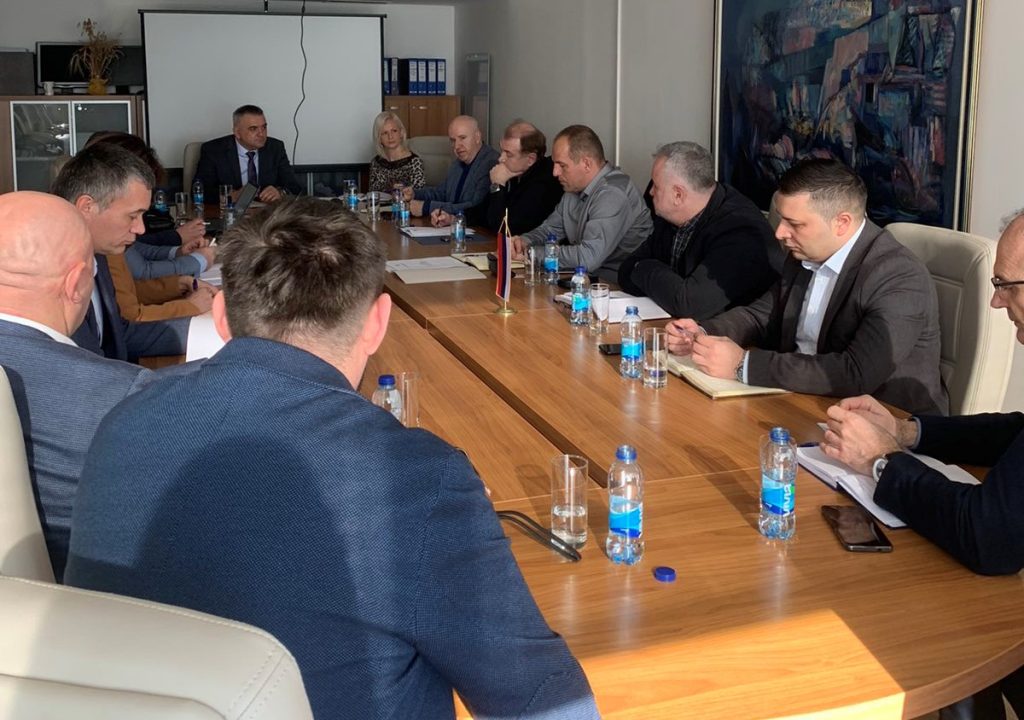
Director of the Republic of Srpska Inspectorate, Milovan Krčo and his associates spoke today with the Minister of Agriculture, Forestry and Water Management of the Republic of Srpska, Savo Minić, about inspection activities in sectors that are legally and essentially related to the affairs of this ministry. The meeting discussed the need for more intensive inspection controls in certain sectors, as well as the methodology of preventive controls, all with the aim of supporting domestic producers and business who work in accordance with current legislation. These are activities in the agricultural, veterinary, forestry and water inspection sectors. Bearing in mind the amounts of funds that the Ministry allocates annually as a form of support to domestic producers, one of the more important issues that has been emphasized is the control of incentives. The determination of the competent authorities is that the incentive funds that are awarded should be available to honest producers and business, and that individuals who commit abuses should be sanctioned by inspectors. Controls will be carried out directly on farms throughout the year, by on-site inspection, as well as by checking records and documentation on the way incentive funds are used.
Inspections of prices still focus of Market Inspection Service

In the past year, the Republic Market Inspection Service has carried out many different activities, such as inspections of sawmills, gravel pits, concrete plants, fast food facilities, issuing invoices and for the most part, extraordinary control of price formation, said Radivoje Gavrić, the Chief Republic Market Inspector, for Glas Srpske. The priority in the work of the Republic Market Inspection Service was the control of the price of goods for which a profit margin was prescribed, and all personnel capacities were directed to these controls. In that segment alone, around 500 controls were carried out, in which fines in the amount of over BAM 3,580,000 were issued. The largest number of irregularities was found at gas stations during the price forming of liquid oil derivatives. In internal traffic, 6,000 inspections were carried out, in which more than 2,000 misdemeanor measures and fines in the amount of BAM 4,376,717 were imposed, while in foreign trade, 12,840 controls of import shipments were carried out and 274 samples were taken for analysis, so taxes in the amount of BAM 257,640 were paid in the budget of the Republic of Srpska. You can read the complete interview at the link: Radivoje Gavrić, Chief Republic Market Inspector: Courts reduce fines for unrealistic prices
IT equipment donated to Labour Inspection Service

IT equipment valued at 33 thousand BAM was delivered today to the Republic Administration for Inspection Activities from the Employment and Social Affairs Platform regional project. The equipment consists of 12 laptop computers and 14 mobile printers. The Republic of Srpska Inspectorate said that combating undeclared work and grey economy continues to be the focus of their activities and they thanked for the donation. The importance of technical equipment for the work of this institution is beyond measure. A smart and useful investment into knowledge and IT equipment is important for everyone. With enthusiasm, work and efforts of our inspector and support of our partners and friends we can expect significant improvement in our work, said the Inspectorate. They added that the equipment would strengthen existing capacities which are currently insufficient due to large number of inspections and employment of new staff. The donated computer equipment will support more intensive inspections in the area of undeclared work, which is of key importance for protection of workers and their rights guaranteed by the law.
Law on protection from harassment at work

The Law on the protection from harassment at work provides for legal protection of workers who suffer any form of harassment at work, which can cause damages of physical, psychological or sexual nature. In regards to that, this institution has adopted a Rulebook on procedures of protection from harassment at work, which in accordance with the Law on protection from harassment at work, prescribes the manner of submitting a request for protection from harassment at work, the manner of naming a committee that conducts the procedure of protection from harassment at work, the person to whom the request is submitted, manner of providing confidentiality of data and other issues important for the procedure of protection from harassment at work. Besides the procedure of legal protection by the employer, a worker can seek protection with the Agency for reconciliation of legal disputes, with the authorised court (with obligation of addressing the employer first with the request for protection from harassment at work, except in exceptional cases), as well as with the competent inspection service (Administrative Inspection Service). You can download the Rulebook at the following link: Rulebook on the procedure of protection from harassment at work
All products “Kinder Schokobons” and “Kinder Surprise Maxi” recalled

After salmonella was found in Ferrero products and recall of some of them, European food safety bodies ordered a recall of all series of “Kinder Schokobons”, “Kinder Schokobons White” and “Kinder Surprise Maxi” (that was not on B&H market), manufactured in a factory in Arlon, Belgium. The recall referrers to all products regardless of the expiry date. The Ferrero Company also closed the said factory in the context of on-going investigation. To remind you, recently dozens of salmonella cases were found in several European countries related to Kinder products. You can find the complete list of recalled products on the following link: List of recalled Ferrero products
Import of oranges from Greece banned

As part of the regular control of shipments on import containing food of plant origin, the Republic Phytosanitary Inspection Service banned import of 20,756 kilograms of oranges from Greece due to increased content of pesticides. Acting upon the results of the analysis, the inspector issued a Decision banning the import of the shipment in question and ordered it to be returned to sender or destroyed under the supervision of a competent inspector. Inspectors’ work at the border, expert risk assessment and timely identification of potential irregularities, are the most important factors which serve to protect the health of consumers and protection of domestic agricultural production. It is important to stress that shipments sampled for testing are banned from marketing, distribution or processing until an inspectors issues a Decision in accordance with the laboratory results. This procedure ensures that if an irregularity is found during testing there is no risk of the product being available on the market.
Intensive inspections of petrol stations

Over the weekend (on 5 and 6 March, 2022) the Republic Administration for Inspection Activities and the competent Market Inspection Service conducted intensive inspections of petrol stations over the territory of the Republic of Srpska. The subject of inspections was adherence to the Regulation on limiting margin profit in price forming of liquid oil derivatives. In two days inspectors conducted 78 controls, and in 37 cases found irregularities and issued 74 minor offence orders in the total amount of BAM 527,100. In order to ensure good business practices and protection of citizens’ rights, the management of the Republic of Srpska Inspectorate and the Chief Market Inspector ordered inspections to continue in the following days. The Republic of Srpska Market Inspection Service is working at full capacity and will continue their inspections. We invite traders to adhere to these Regulations, because the prescribed fines are high, and each violation will be severely penalised. Fines for violations of this Regulation for the seller is BAM 10,000, and BAM 5,000 for the responsible person.
Nine tons of clementines banned from import

Under regular inspection of shipments in foreign trade, the Republic Phytosanitary Inspection Service banned import of shipment of clementines in the amount of nine tons originating from the Italy after determining that it does not meet prescribed phytosanitary requirements. Inspectors’ work at the border, expert risk assessment and timely identification of potential irregularities, are the most important factors which serve to protect the health of consumers and protection of domestic agricultural production. It is important to stress that shipments sampled for testing are banned from marketing, distribution or processing until an inspectors issues a Decision in accordance with the laboratory results. This procedures ensures that if an irregularity is found during testing there is no risk of the product being available on the market.
Establishing the Interoperability Information System in Bosnia and Herzegovina has begun
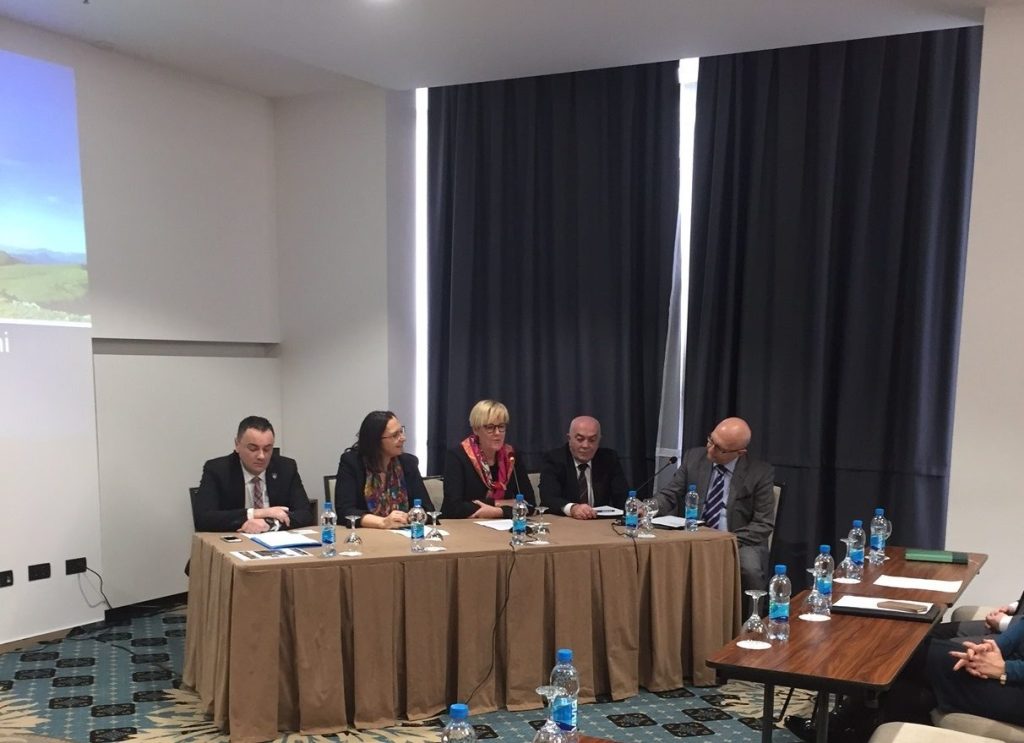
Predrag Tomić, the director on the Republic of Srpska Inspectorate attended to the meeting on 12th December 2016 which was held in Sarajevo regarding the start of activities on establishing the Interoperability Information System in Bosnia and Herzegovina, which is being realized within the “Improving Investment Climate and Institutional Strengthening Project – ICIS.” The World Bank and entity inspectorates – Republic Administration for Inspection Activities of Republic of Srpska and Federal Administration for Inspection Affairs (FUZIP), with the help of Swedish International Development Agency (SIDA) have been implementing the ICIS project since 2012. During the meeting, numerous activities already realised within the project were summed up, such as the acquisition of equipment for inspection surveillance, the professional education of personnel via trainings and study visits, the development of inspection methodologies, the building of concept for inspection controls based on analysis and risk assessment and others. Moreover, activities on establishing the Interoperability Information System planned for the following period, from concrete steps regarding the implementation, software development, equipment installation and the training of personnel in using the new software, to legal frameworks for establishing the interoperability were presented. The implementation of the Interoperability Information System will enable an e-link and a better system for the exchange of information between the institutions in the Republic of Srpska and Bosnia and Herzegovina, which will greatly contribute to the improvement of inspection surveillance. The Republic of Srpska Inspectorate has a daily need for the access to other institutions’ databases in order to manage risks in planning the inspection surveillance, while having numerous information on its disposal which might be helpful to other institutions. In that sense, the e-link between the institutions will enable the exchange of data in a fast, prompt, reliable and safe way with a guaranteed discretion and the integrity of data, in accordance with the rules of information security.
Contract on realisation of Interoperability Information System signed
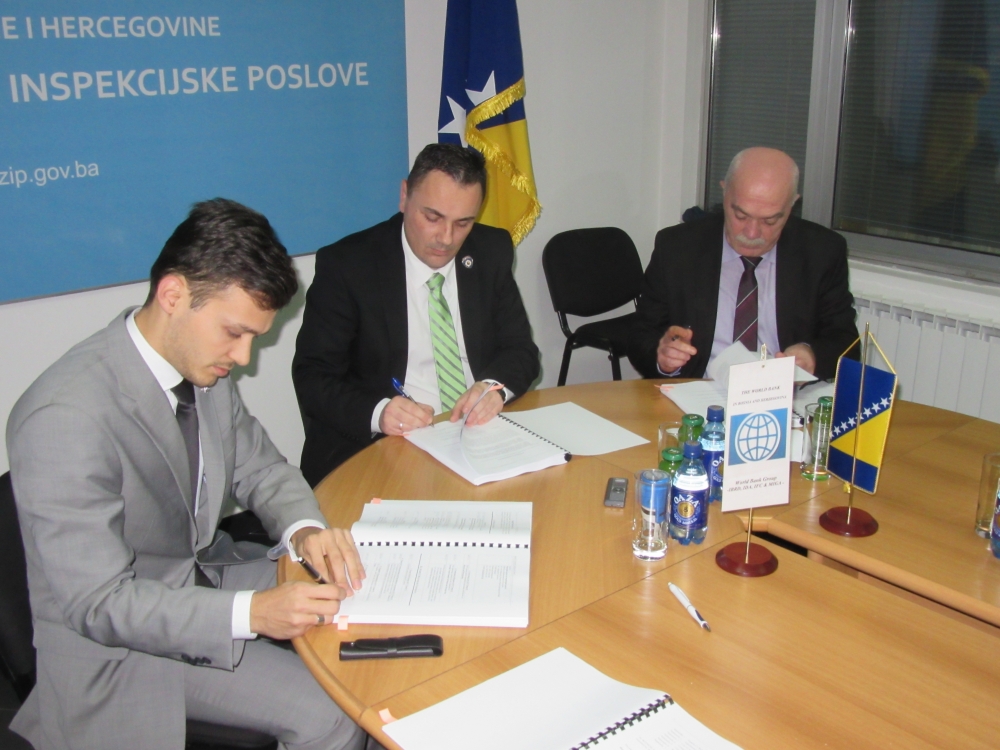
On November 3rd 2016 in Sarajevo, the director of the Republic of Srpska Inspectorate Predrag Tomić, director of the Federal Administration for Inspection Activities Anis Ajdinović and the representative of the consortium of companies JV Lanaco LLC, Ping LLC and InfoSoft Systems, signed the contract on the realization of the Interoperability Information system within the “Improving Investment Climate and Institutional Strengthening Project – ICIS.” Electronic connections and establishing the exchange of data between the institutions will be of great significance for the Republic of Srpska Inspectorate which has, in its work, the need to access various registers and databases about business entities, and which are primarily lead by other institutions. It is a system that will be the platform for the future data exchange between the institutions. The contract signatories agreed that the realisation of the Project will increase the level of utilization of existing information that individual institutions have access to. The data will be exchanged in a quick, timely, reliable and safe way with secured privacy and the integrity of data, and in accordance with the rules of information security. The existing information systems in institutions interested in the exchange of data will be the primary source of information in the Interoperability Information system. The part of the ICIS project which refers to interoperability is led by the Agency for Information Society of the Republic of Srpska and the Sector for Information Technologies of the Secretariat General of the Republic of Srpska Government.
Measuring devices for inspection surveillance valued at around 11.000KM acquired
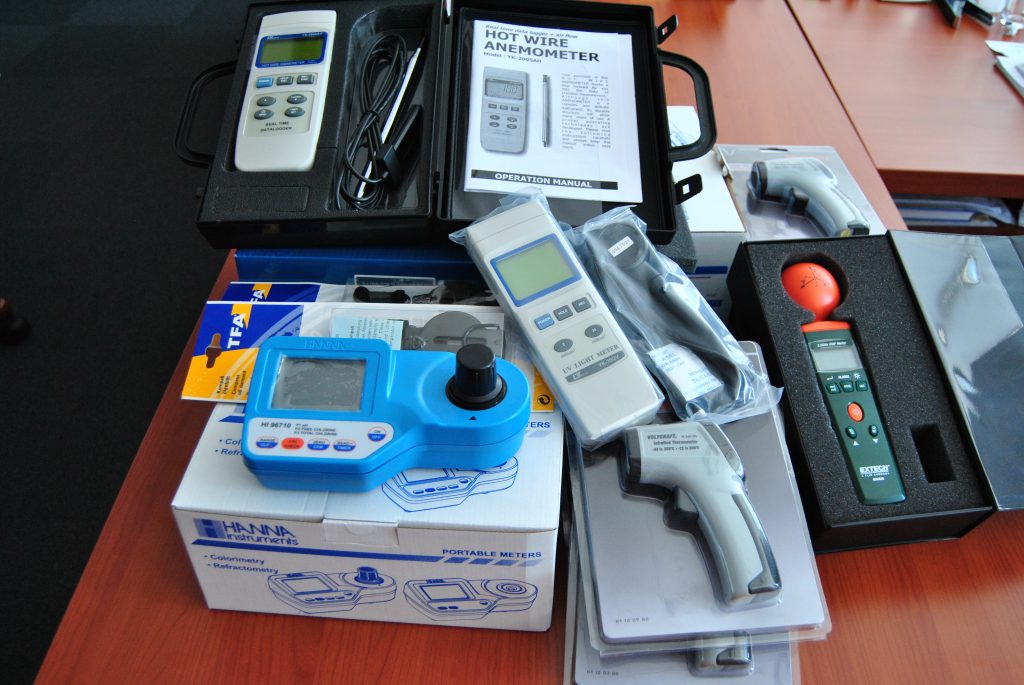
Within the Improving Investment Climate and Institutional Strengthening project (ICIS) which is funded by a Swedish International Development Cooperation Agency (SIDA) grant, and administrated by International Bank for Reconstruction and Development (WB IBRD), the Republic of Srpska Inspectorate has acquired equipment for the needs of food, phytosanitary, agricultural, and health inspection services. Various measuring instruments have been acquired, and by using them, inspectors will quickly and easily be able to conduct the inspection of basic parameters in the areas under surveillance which are the key for future inspections. Non-ionizing radiation measuring devices, such as: Low Frequency measurement for EMF – ELF tester, High Frequency measurement for EMF – RF EMF Strength Meter, Hand-held UVA – UVB Radiometer, Hand-held UVC Radiometer have been acquired. These devices will considerably improve surveillance over objects which emit non-ionizing radiation such as mobile service base stations, radio and television facilities, beauty salons with devices emitting UV radiation and other. Other acquired devices are: thermo-anemometer with memory, interface and software, able to calculate spatial currents (flow), waterproof digital thermometer with a probe, pH and chlorine tester, hand-held refractometer, and other devices. The use of these devices will enable more efficient inspection surveillance.
Inspection surveillance equipment procured
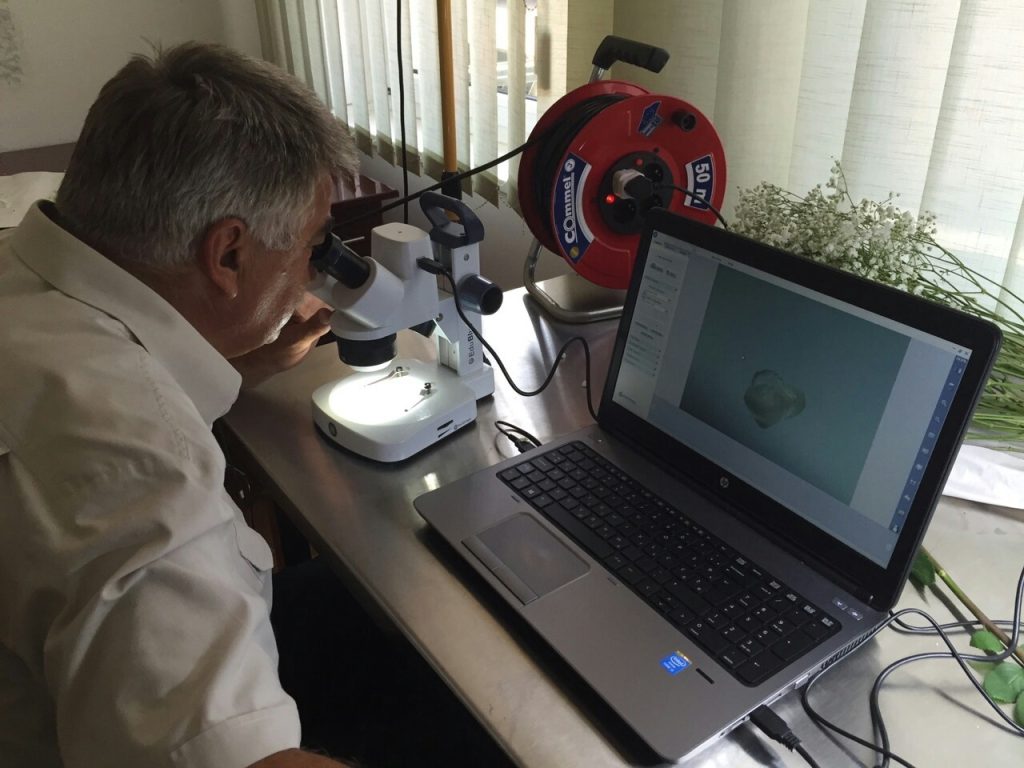
The Republic of Srpska Inspectorate has procured inspection surveillance equipment within the Wold Bank Improving Investment Climate and Institutional Strengthening Project in the total value of 150,000 BAM. This equipment will be used by the Food Safety, Phytosanitary and Agricultural, and Health Inspection Services. In order to improve the quality and effectiveness of inspection surveillance, both during import and in the internal market, this equipment will enable inspectors to quickly and easily inspect basic parameters and indicators that are essential for further inspection procedures. Some of the procured equipment is: microscopes for phytosanitary examination, sampling probes for various goods, portable refrigerators for transport of samples to laboratories, GMO test kits, phytosanitary examination desk, protective equipment for inspectors and other. Among other uses, this equipment is going to improve inspection of goods during import, with special emphasis on import of food and plants, which is essential for the protection domestic agricultural production and health of the population. One of the examples is the use of microscopes for phytosanitary examination where inspectors will, while inspecting plants during import will be able to immediately detect pests on plants and take timely measures to prevent the introduction of harmful quarantine organisms into the Republic of Srpska.
Results of ICIS project presented
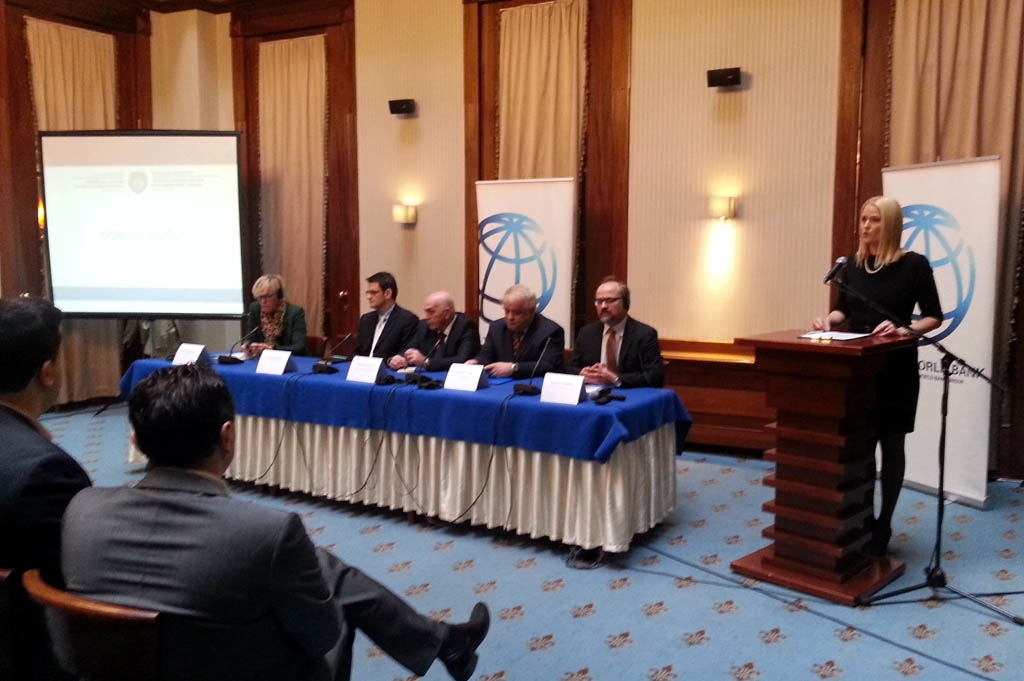
On 10 December, 2015 in Sarajevo, the Republic Administration for Inspection Activities of the Republic of Srpska and the Federal Administration for Inspection Activities the results of a part of the Technical Assistance for Improving Investment Climate and Institutional Strengthening Project (ICIS) that relate to training and education. This part of the project was conducted by the “Jacobs, Cordova & Associates” Consulting Company, and it relates to training of agricultural, i.e. phytosanitary inspectors, health, veterinary, water, environmental, market and food safety inspectors. The implementation of project activities included 12 workshops with total of 144 participants according to topics selected by the Inspectorates of the RS and the FB&H, as well as a series of meetings and four seminars during which possibilities for further improvement of inspection work were discussed. As a part of the contract on consulting services, the consulting firm organised a study tour to Northern Ireland, where representatives of inspection authorities of the Republic of Srpska and the Federation of Bosnia and Herzegovina visited the City of Belfast inspection service, UK Food Standards Agency, Northern Ireland Department of Agriculture and Rural Development, as well as two food establishments that are examples of good practices in food production and cooperation with inspection authorities. One of the goals of the project is harmonization and standardization of inspection procedures, and improving the synergy effect of inspections, which involves having several inspection services working at the same time in order to save the time of businesses and inspectors, and which will in turn result in more efficient and effective inspection surveillance. New webpages of the Inspectorates of the Republic of Srpska and the FB&H were also developed within project activities. The ICIS project consists of three parts and includes procurement of IT equipment and specialised equipment for inspectors, training for inspectors, and developing an interoperability information system. The project has been realised with assistance of the World Bank Group in partnership with the Kingdom of Sweden and its International Development Agency (SIDA).
Uručeni skeneri za potrebe APIF-a
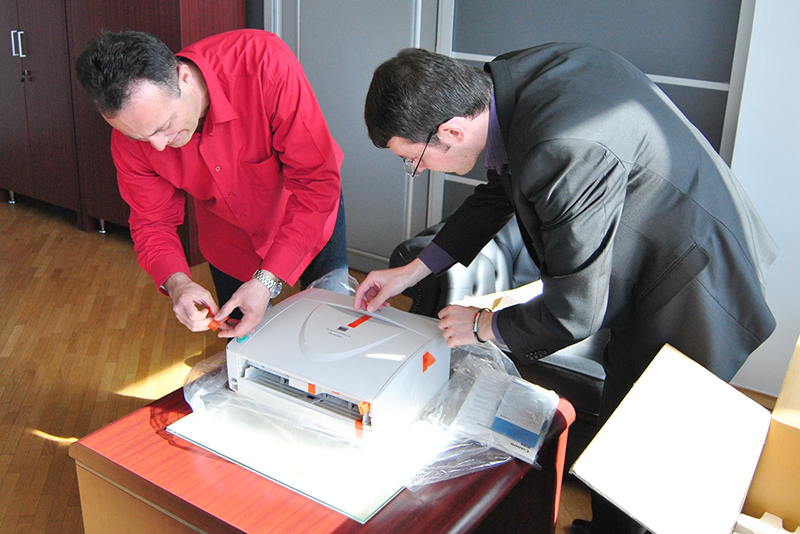
Predstavnici Ministarstva pravde Republike Srpske, Ministarstva za ekonomske odnose i regionalnu saradnju Republike Srpske, Agencije za posredničke, informatičke i finansijske uslige Republike Srpske i Inspektorata Republike Srpske, održali su 21. aprila 2015. godine sastanak na kojem je izvršena primopredaja računarske opreme nabavljene u okviru projekta „Unapređenje investicionog okruženja i institucionalno jačanje – ICIS”. Nabavljeno je sedam skenera koje je Inspektorat Republike Srpske kao Jedinica za implementaciju ICIS projekta nabavio za potrebe vođenja registra poslovnih subjekata za koji je zadužena Agencija za posredničke, informatičke i finansijske usluge Republike Srpske. Dio skenera će se koristiti u sudovima za skeniranje i digitalizaciju sudske građe o registraciji privrednih subjekata iz prošlosti u cilju formiranja jedinstvenog registra poslovnih subjekata. Finansijska sredstva za nabavku skenera nisu bila prvobitno predviđena Planom nabavki ICIS projekta, ali je zahvaljujući inicijativi Inspektorata dobijena saglasnost Svjetske banke za realokaciju postojećih sredstava i izdvajanje jednog dijela, upravo za nabavku pomenutih skenera. Registar poslovnih subjekata ima veliki značaj za Inspektorat Republike Srpske, jer kao takav u elektronskoj formi predstavlja „bazu subjekata kontrole” i osnovu za efektivno i efikasno planiranje inspekcijskih kontrola. U sklopu ICIS projekta, kao posebna komponenta, predviđeno je i uspostavljanje Informacionog sistema za interoperabilnost koji će upravo omogućiti povezivanje registara koje vode institucije javne uprave Republike Srpske i elektronsku razmjenu podataka između njih. Vlada Republike Srpske je Odlukom od 05.09.2012. godine prihvatila donaciju Švedske agencije za međunarodni razvoj (SIDA), a u svrhu realizacije projekta „Unapređenje investicionog okruženja i institucionalno jačanje – ICIS”. Administrator granta je Svjetska banka prema čijim pravilima i procedurama se vrši nabavka i finansijsko upravljanje u projektu. Projekat se sastoji od dva dijela, od kojih se prvi odnosi na entitet Republiku Srpsku i Brčko distrikt BiH, a drugi na entitet Federaciju BiH i zajedničke institucije Bosne i Hercegovine. Svaki pojedinačni dio projekta sastoji se od sljedećih komponenti: uspostavljanje sistema za razmjenu podataka i informacija, reforma inspekcija kroz unapređenje kvaliteta rada inspekcijskih organa i redizajniranje i pojednostavljivanje procedura osnivanja i gašenja preduzeća.
Potpisan ugovor o pružanju konsultantskih usluga u okviru ICIS projekta
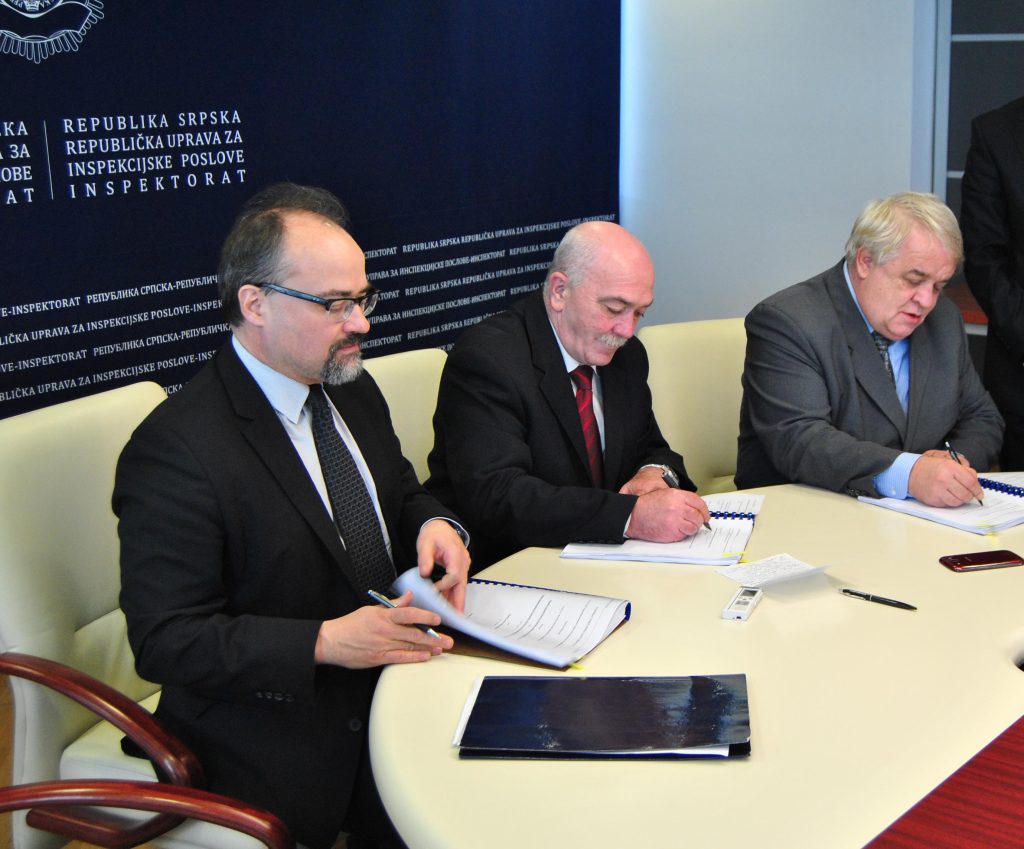
Vršilac dužnosti direktora Inspektorata Republike Srpske, Predrag Tomić i direktor Federalne uprave za inspekcijske poslove, Ibrahim Tirak potpisali su 11.02.2015. godine u Banjaluci sa Cezarom Kordova, predstavnikom konsultantske kuće „Jacobs, Cordova & Associates” ugovor o pružanju konsultantskih usluga u okviru projekta „Unapređenje investicionog okruženja i institucionalno jačanje- ICIS”. Projekat se sastoji od dva dijela, od kojih se prvi odnosi na entitet Republiku Srpsku i Brčko distrikt BiH, a drugi na entitet Federaciju BiH i zajedničke institucije Bosne i Hercegovine. Svaki pojedinačni dio projekta sastoji se od sljedećih komponenti: uspostavljanje sistema za razmjenu podataka i informacija, reforma inspekcija kroz unapređenje kvaliteta rada inspekcijskih organa i redizajniranje i pojednostavljivanje procedura osnivanja i gašenja preduzeća. Inspektorat Republike Srpske vodi drugu komponentu projekta koja predviđa dalje jačanje kapaciteta Inspekcijskog sistema Republike Srpske uvođenjem sistema kontinuirane obuke inspektora, standarda i metodologija inspekcijskog nadzora, sistemskog pristupa u razmjeni podataka, bolje funkcionalne povezanosti sa odjeljenjima za inspekcijske poslove u jedinicama lokalnih samouprava, te bolje povezanosti sa privatnim sektorom i građanima. S obzirom da je jedan od strateških ciljeva Inspektorata kontinuiran rad na unapređenju inspekcijskog sistema u Republici Srpskoj, sredstva iz ovog projekta namijenjena su za nabavku opreme za inspekcijski nadzor, edukaciju inspektora i unapređenje procedura rada. Korišćenjem efekata sinergije i sistemom zajedničkih kontrola nastoji se smanjiti opterećenost subjekta kontrole kako bi svoju djelatnost mogli obavljati nesmetano, obezbjeđuje se bolja iskorištenost resursa, što doprinosi povećavanju kvaliteta kontrola zbog kompleksnosti i sljedlivosti inspekcijskog nadzora. Kroz dio projekta koji se odnosi na interoperabilnost, a koji vode Agencija za informaciono društvo Republike Srpske i Sektor za informacione tehnologije Generalnog sekretarijata Vlade Republike Srpske, omogućiće se elektronska povezanost i razmjena podataka između institucija, što će Inspektoratu biti od velike koristi, s obzirom da u redovnom radu imamo potrebu za pristupom registrima i bazama podataka drugih institucija kao što su Poreska uprava RS, Ministarstva, APIF i druge. Projekat se finansira nepovratnim sredstvima Švedske agencije za međunarodni razvoj (SIDA).
Ponuda za iznajmljivanje Trening centra Inspektorata

Republička uprava za inspekcijske poslove raspolaže sa dvije konferencijske sale u Područnom odjeljenju Banja Luka, koje se nalaze u ulici Veljka Mlađenovića bb, u krugu Incela”. Riječ je o Konferencijskom trening centru koji se sastoji od jedne sale sa 500 mjesta i jednesale sa 100 mjesta i podoban je za sve vrste sastanaka, seminara, radionica i drugih poslovnih događaja u savremeno opremljenim salama. Centar je opremljen najsavremenijom audio-video opremom, i to: – audio razglasom, – opremom za simultano prevođenje (128 prenosnih RF jedinica sa podrškom za simultano prevođenje na dva jezika i sa mogućnošću da se prevod reprodukuje na audio razglasu u slučaju da veći broj slušalaca zahtjeva prevod) i – opremom za audio/video snimanje sa mogućnošću direktnog audio/video emitovanja. Uz iznajmljivanje sala, takođe Vam nudimo i obezbjeđen parking prostor, mogućnost rada vikendom, kao i popust u slučaju više dana iznajmljivanja sale. Cijena iznajmljivanja je prikazana u Cjenovniku iznajmljivanja Konferencijskog trening centra Republičke uprave za inspekcijske poslove. Dodatne informacije možete dobiti na broj telefona: 051/334-625 ili putem e-mail adrese: uprava@inspektorat.vladars.net
